bomb damage to Ramsgate | Click here to buy the book or look at our other publications about Ramsgate and the surrounding area
Title 3
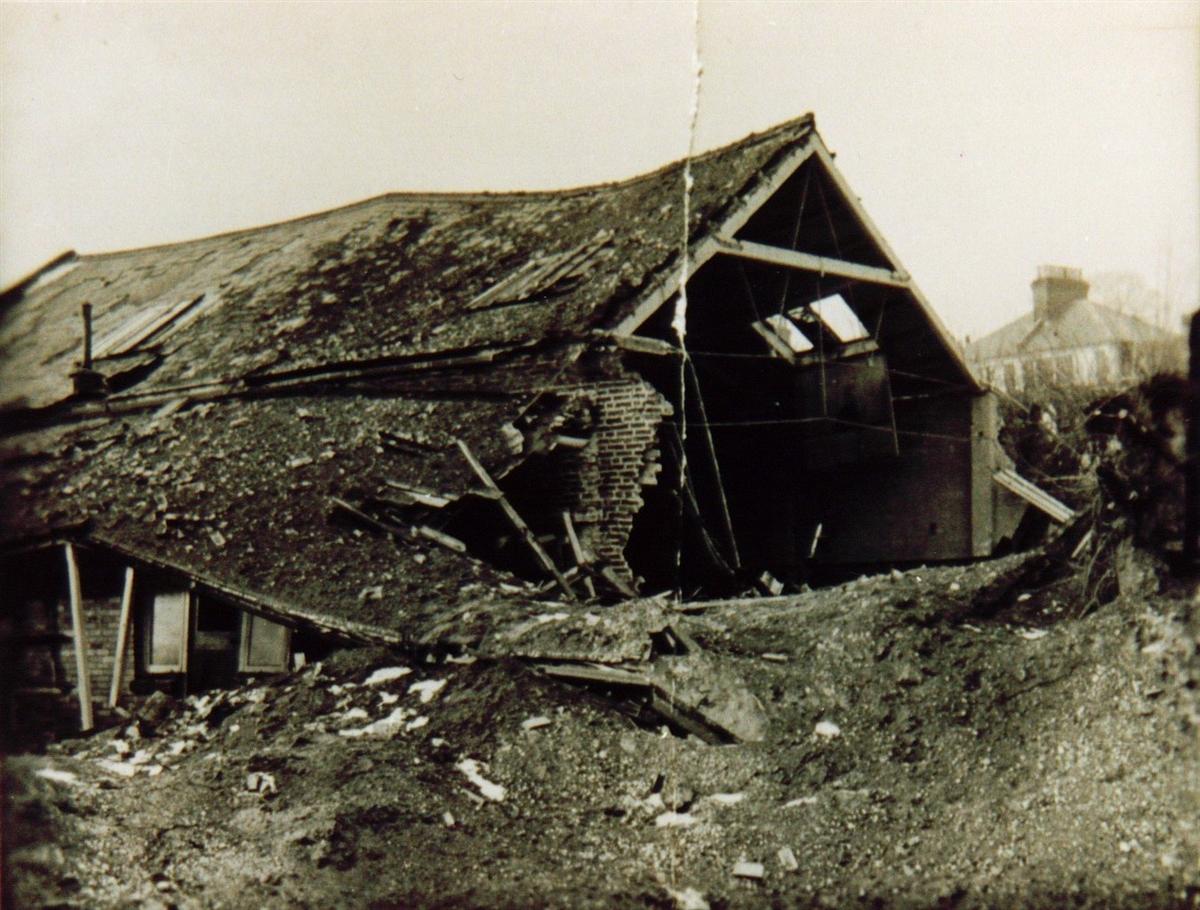
Back of Hudsons Flour Mill
SATURDAY. 24, AUGUST 1940.
Ramsgate's great air raid of Saturday, 24, August 1940 is now a matter of history, and it is possible to regard it in fair perspective. Although there was a great deal of damage, and many casualties, fatal and otherwise, we can say without fear of being accused of distorting the effects, that the town has emerged triumphant.
The attitude of the people is well summarised by a remark made to us by a burly housewife "I've lost my home," she said, " And I nearly lost my life, but after all, there is a war on and I suppose we must expect such things to happen. But, if Mr. Blooming Hitler thinks he can put the wind up us by bombing women and kids-well, he's got another think coming, thatís all". And so it is all over the town. While commiserating with the bereaved and the injured, Ramsgatonians have accepted the position with cheery philosophy. The only real irritation they feel is that Hitler (they insist on blaming him personally) has been responsible for depriving them of gas with which to cook their dinners or boil a kettle for tea. But even this difficulty has been overcome by good will and neighbourliness. Oil stoves, many of them true veterans, have come into their own again, and there are many instances in which groups of friends have banded together to cook communal meals. Ever and again the Britisher's unquenchable sense of humour has sparkled Gazing at a street literally paved with glass, an onlooker exclaimed, "Blimey What a bad day for window cleaners". Ramsgate has passed through its ordeal by bomb and flame, but it's spirit is unbroken, and the town still carries on.
We have tried below to present a plan unvarnished description of the damage done, and to recount some of the incidents which have occurred. When the fatal raid took place, one of our representatives was standing in the vicinity of Albion House, watching the deadly anti-aircraft gunfire, and says it appeared that the German formation was broken up at least twice before it could get far beyond the coastline. Then
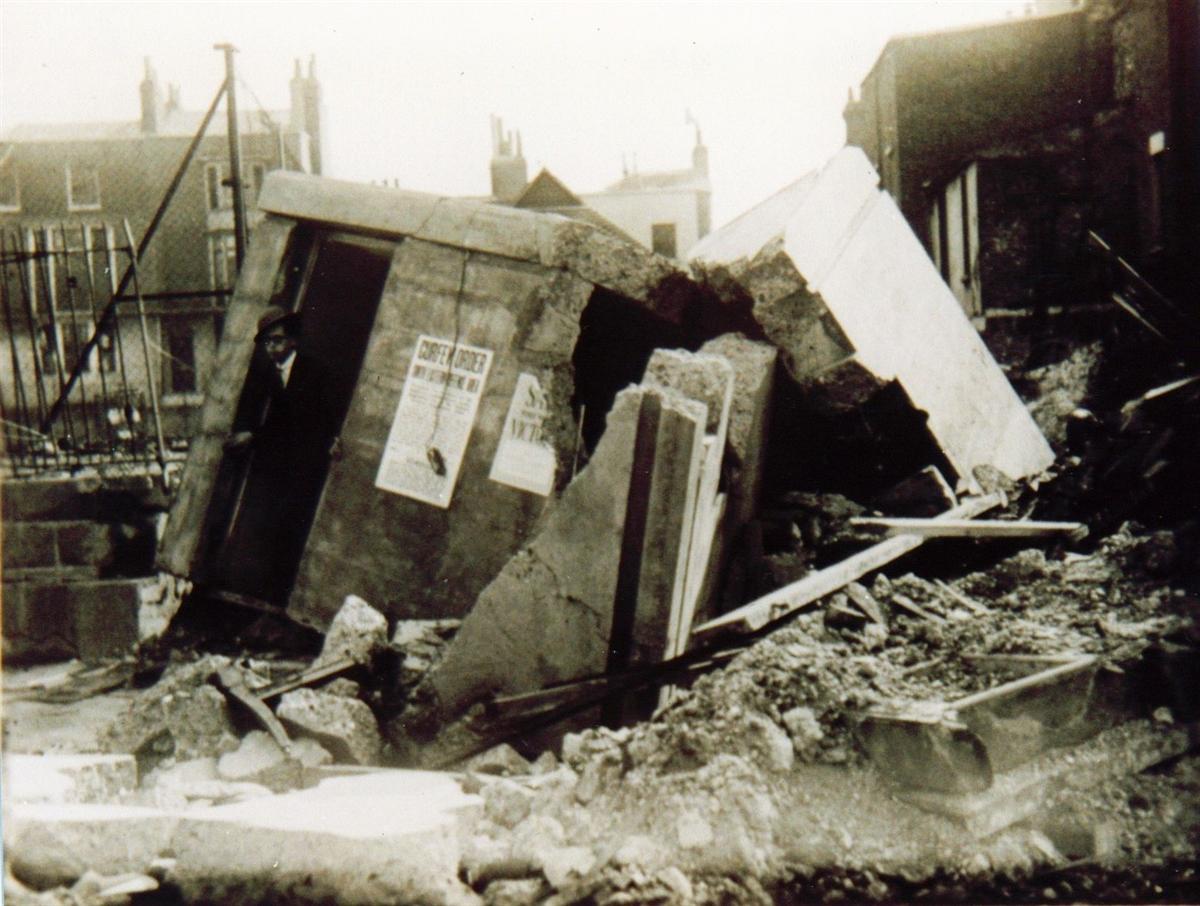
A bomb hit the Warden's Box in Camden Square. Warden Kayes who was inside, sustained a broken leg. The person standing in the box is Harold Bull. He was a journalist for the East Kent Times.
reforming at sea, it came on again, obviously bent on mischief. The shrapnel was so thick that he and a colleague from another news-paper retreated to the door-way of Albion House in order to avoid falling fragments. Suddenly, the air seemed to be full of screaming objects. He saw one fall on the harbour, and then, yelling to his companion to run for safety, he bolted down the corridor of the building to try and reach the reinforced cellar in the basement. He had only taken a few paces down the passage when there was a deafening explosion. "I felt a hot blast on my neck" he says "and it seemed as though I had been hit in the back by a warm feather bed, I was sent spinning down the corridor. I saw my colleague on ahead of me. He crashed into a doorpost and was flung headlong down the stairs into the basement. It was only his steel helmet which saved him from serious injury. As it was his hands were cut by glass splinters, fortunately, I escaped injury.
The cellar shelter was crowded with people of both sexes, mostly members of departments, but among them were several passers-by, who had prudently taken cover. Lights had failed, and it was in pitch darkness that they listened to the pandemonium outside. It seemed as though all the fiends in hell had broken loose. Bombs came down like rain and the whole fabric of the building rocked. Mingled with the terrific detonations of the bombs was the barking roar of the anti-aircraft guns the crash of falling masonry and splintering glass and the sharp rattle of machine-gun fire. In spite of it all, there was no sign of panic, although an extra loud detonation brought an occasional muffled scream from some of the ladies. Lights were soon obtained, then everyone was more comfortable, and there was something in the nature of a roll-call. It was known that the Mayor (Alderman A.B.C.Kempe) had been among those in Albion House who had made for the shelter when danger was imminent, but he could not be found. A search party was hurriedly assembled, and during a lull in the firing, they made investigations.
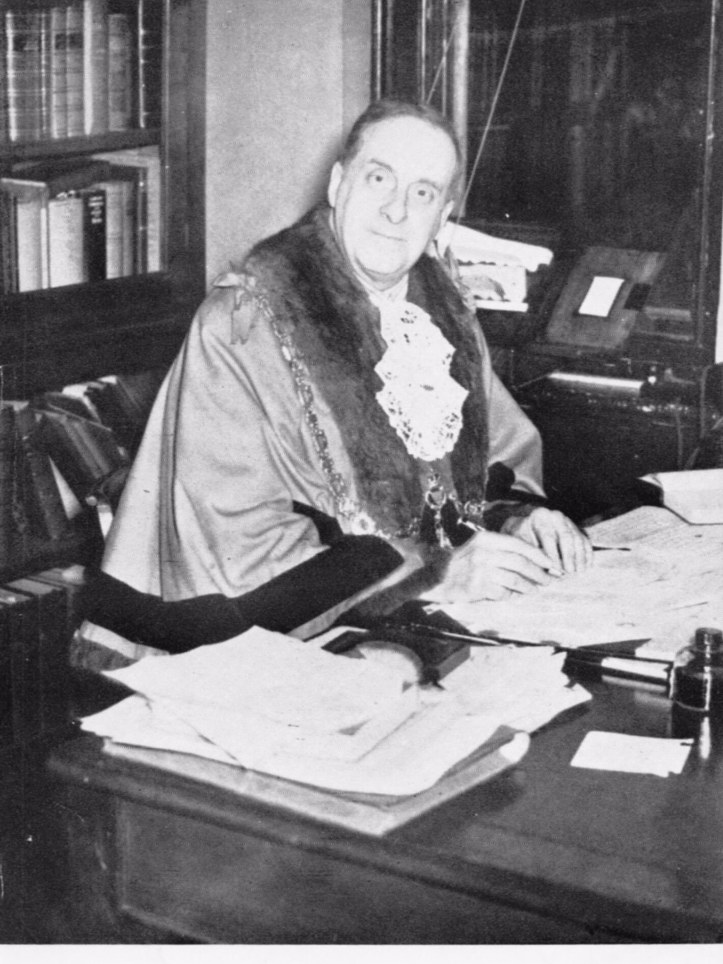
The Mayor
They soon found the Mayor. He had been forced to take refuge in the area. There, blinded by coming so suddenly out of the brilliant sunlight, he had feared to move in case he exposed himself to more danger. It was fortunate for him that he had kept his head. He was covered with fragments of debris and splinters, and rather shaken, but was otherwise unhurt. Once he had been dusted down and had been given an opportunity to wipe the grit out of his eyes, he was his old cheerful self again. Afterwards it was discovered that a bomb had dropped in the road above, within 20 feet of where he was standing. As soon as it was reasonably safe to leave the shelter, our representative emerged to try and see what had happened. Although several minutes had passed, the air was still filled with a dust as clinging and
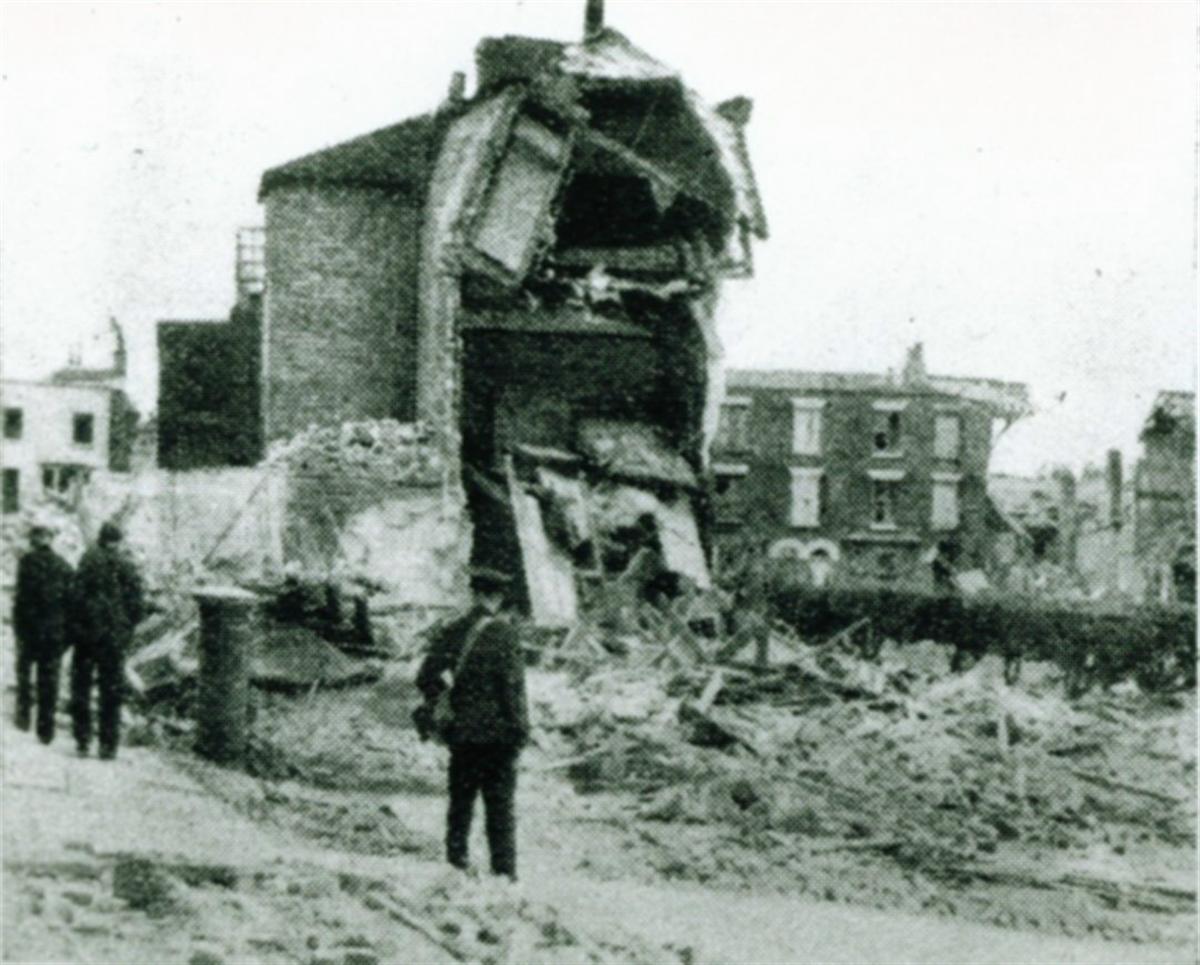
Camden Square
impalpable as flour. It was impossible to see more than a few feet. When the dust-cloud had settled, our representative says that the sight, which met his eyes, was almost unbelievable.
One bomb, the blast from which hurled him down the corridor, had dropped at the foot of the lamp standard on the top of Madeira Walk. This had made a crater about six feet deep and ten feet in diameter. The thick reinforced concrete of the roadway had been broken like piecrust, but the lamp standard was still standing.
Another bomb had dropped in the corner of Albion Gardens a few feet away, and shrubs, torn up by the roots, had been flung in all directions. The top of the roof of a motorcar nearby was torn completely off, but the car was otherwise undamaged. Three other bombs had dropped almost in the doorway of a house on the opposite side of the road from the car. The steps leading to the door had collapsed into the area. Along the whole of the eastern side of Albion Place there was not a single unbroken window. Glass, inches deep was strewn in the roadway.
Looking westward, flames could be seen torching up from the middle of the town, and it was soon realised that Messrs Vye's premises in Queen Street were on fire. Dense volumes of smoke through which fierce flames flickered, were pouring from the vicinity of the Gas Works. It was a sight of mingled terror and grandeur. Then it was appreciated that if the back of the Borough Engineer's offices had been blown out, there was every possibility that the Borough Engineer (Mr. R.D.Brimmell) and his staff were buried in the debris. Our representative and others ran along the road to see what could be done, and were debating the best means of tackling the problem when the Borough Engineer appeared. He was unrecognisable. It was as though someone had emptied a sack of cement over his head.
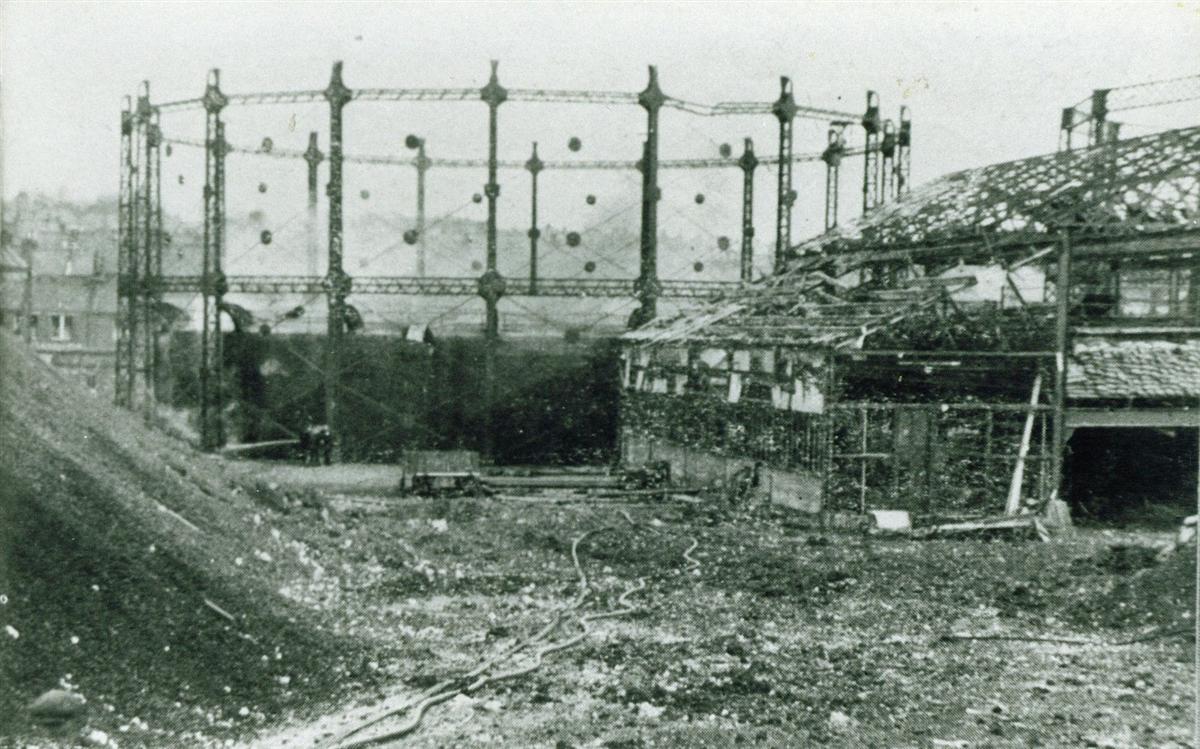
Gas Works
The Gas Works Between St Lukeís Avenue and Boundary Road
His face was covered with a mask of dust, he was scarcely able to open his eyes, and saliva had caked the filth round his lips. It was impossible to see the colour of his clothing. But he brought good news. He and seven other members of his staff had taken refuge in an Anderson shelter at the rear of the offices and although tons of debris had fallen on them they had escaped without a scratch.
When the "All Clear" signal came, our representative began an investigation of what had happened. Round at the rear of Albion House, in Cottage Road, there was not a single undamaged house.
The backs of the houses in Albion Place, adjoining Albion House, were completely wrecked one house was split from top to bottom, and such was the force of the explosion, that the bricks which remained standing appeared to be separated from one another. Among the wreckage hung a complete window frame without a single pane of glass in it cracked.
Cottage Road was almost impassable. It was piled high with debris of every possible description. At the end furthest from the sea, another house had been split in halves and in the roadway lay the twisted remains of a ladies bicycle. Near by was a pillow and a mattress flung from a bed in a neighbouring cottage.
The Mews, leading to La Belle Alliance Square, ware completely wrecked. There, many families had stored their furniture. This could be seen through the interstices of smashed beams and broken walls. Most of it was obviously damaged beyond repair. Here and there, people were making tentative efforts to reach some of their most prized possessions.
Coming into La Belle Square, it appeared at first that the houses there had escaped but it was not so. Along the eastern side, most of the windows of the houses, and all the "Camden Arms" were splintered.
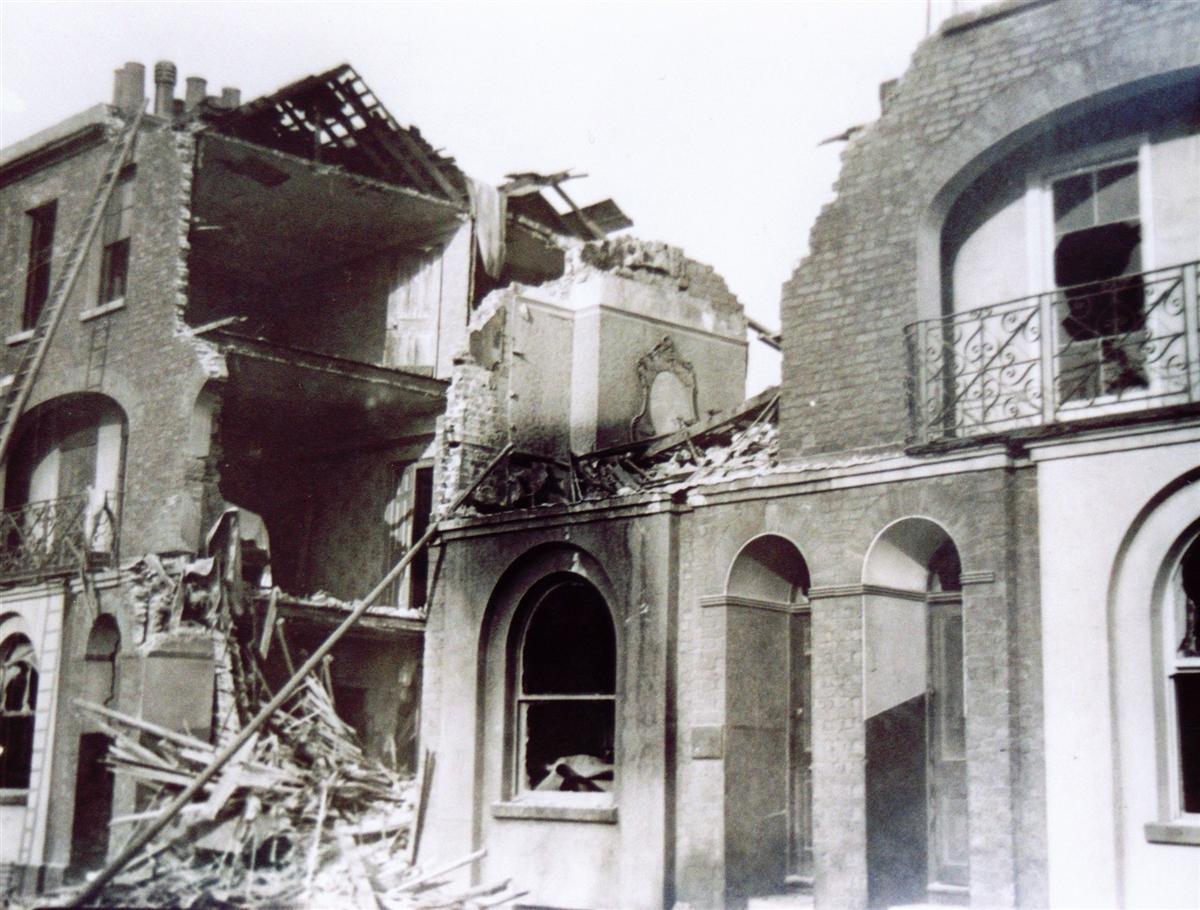
Camden Road
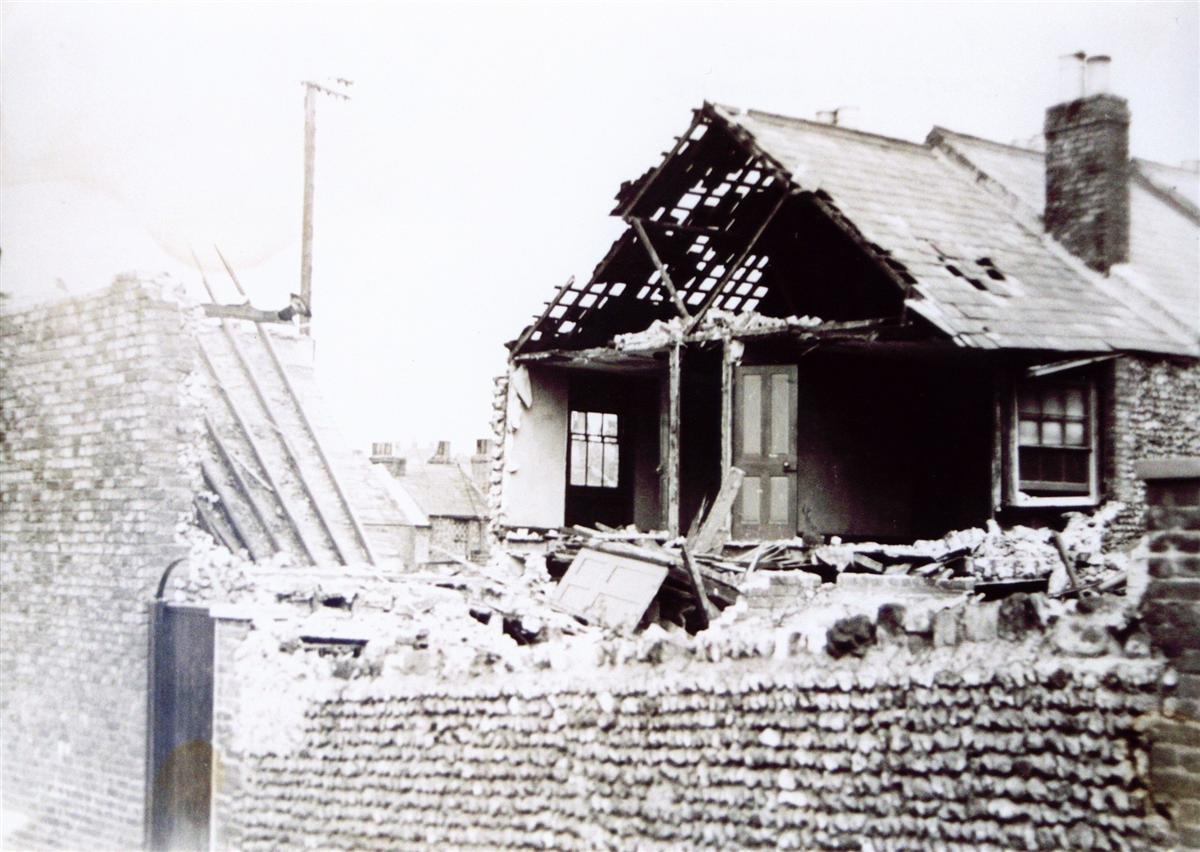
Camden Road
Next door to the Better Butt Inn a house had been split and the house next door to that was simply a heap of ruins. It was here that a fatal casualty had occurred. A bomb had dropped into the roadway opposite the Better Butt Inn, severing the water main, and water was spurting from the crater like a fountain and pouring down through Camden Square. Many houses in Camden Square were without windows and one house, which had simply a smoking shell.
As our representative went on his way towards Queen Street, it was obvious that Messrs Vye's premises (outside of which had been another fatal casualty) was still ablaze, although the fire brigade and members of the A.F.S. were by then getting the flames under control. Then another raid alarm was sounded and, like his colleague in another part of the town, this representative had to abandon his tour of inspection and investigation until Sunday. However, the fire brigade and A.F.S. continued their work at Messrs Vye's establishment, and on Sunday, when our representative went out to pick up the threads of his work, he found that although the premises had been absolutely destroyed, the fire fighters had prevented the flames spreading to adjoining properties.
Continuing his walk by way of High Street, this representative describes the scene which met him as one which might have been expected after an earthquake. The Assembly Rooms was almost completely wrecked, as were houses opposite, and premises within a few doors of the Assembly Rooms were entirely demolished. It was from these that an aged couple were rescued by an A.R.P. Warden.
Every house above this point to the end of the street was more or less damage, and in Park Road behind, several, including the residence of Alderman W.T.Smith, was wrecked.
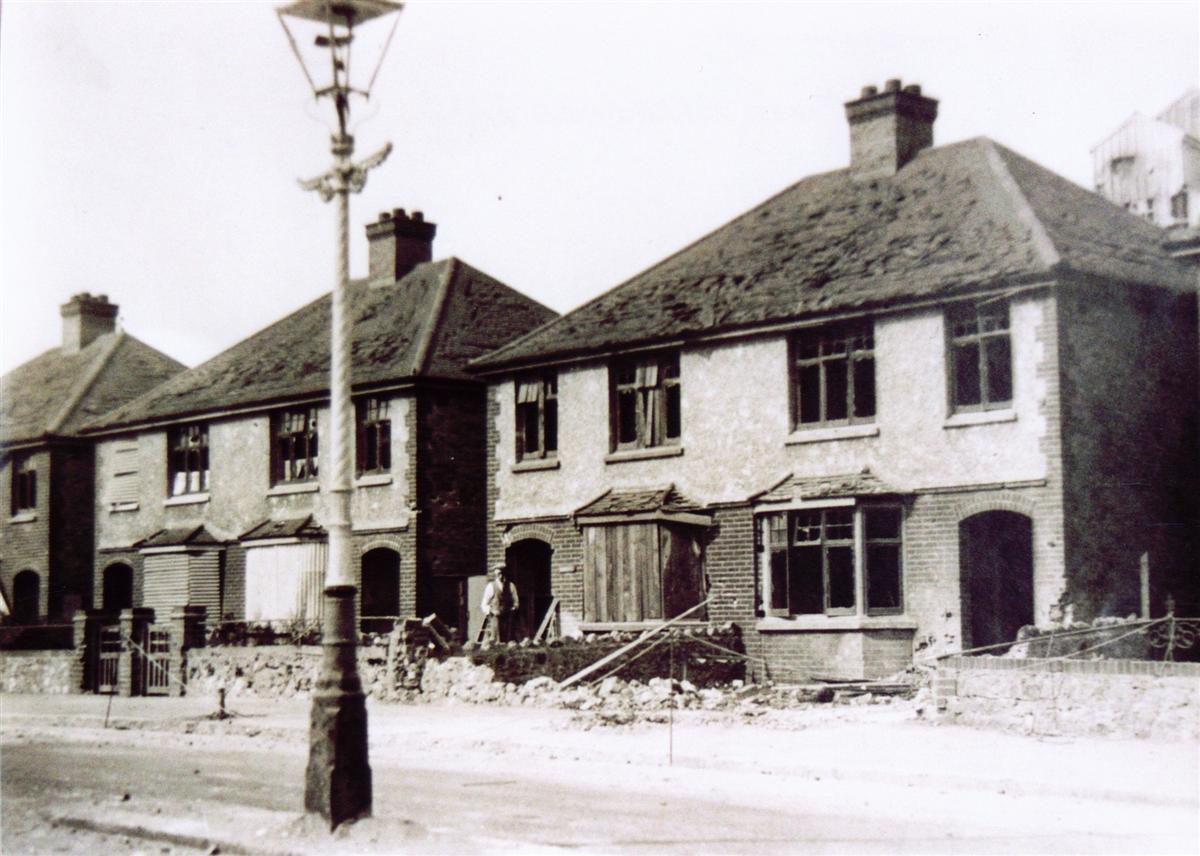
Station Approach Road
In Wrecked houses met his gaze in Elmstone Road. It was there that an aged lady was taken from her Anderson shelter which had sustained practically a direct hit. She was badly injured, but is now on the way to recovery.
In Station Approach Road; and the lower end of Stanley Road, there was not a single house which had not suffered. One at least was entirely demolished and others were minus roofs it was in this neighbourhood that a police officer was killed (No. 29. P.C. Ticehurst) as he was sleeping after being on duty the previous night.
Here the story of the wreckage and demolition of buildings and houses is taken up by another "East Kent Times" representative who made two tours of the devastation area. He was one of those who was in Chatham Street when the first air raid warning sounded, and made a dash into the Townley Castle entrance to the tunnel shelters, at the same time that German bombers could be seen flying nearly overhead dodging anti-aircraft gunfire. As the people were descending the steps into the shelter there was a terrific explosion. Everything seemed to tremble violently, and the place was plunged into darkness, but in a very few minutes oil lamps were brought along by wardens and police. Other persons, some of whom had received superficial cuts from fragments of flying glass and splinters, joined the company in the shelter. They had left their homes or business premises after taking other cover during the raid and made a dash for the greater measure of safety which the tunnels provided.
When the "All Clear" sounded they made their way up to the street where almost indescribable scenes met their gaze. The carriage-ways and pavements were littered with broken glass and debris, and all around them were distressing evidences of the disastrous effects of the enemy bombs. The scenes made an imperishable impression on their minds. A quick walk round other devastated streets was ended by another
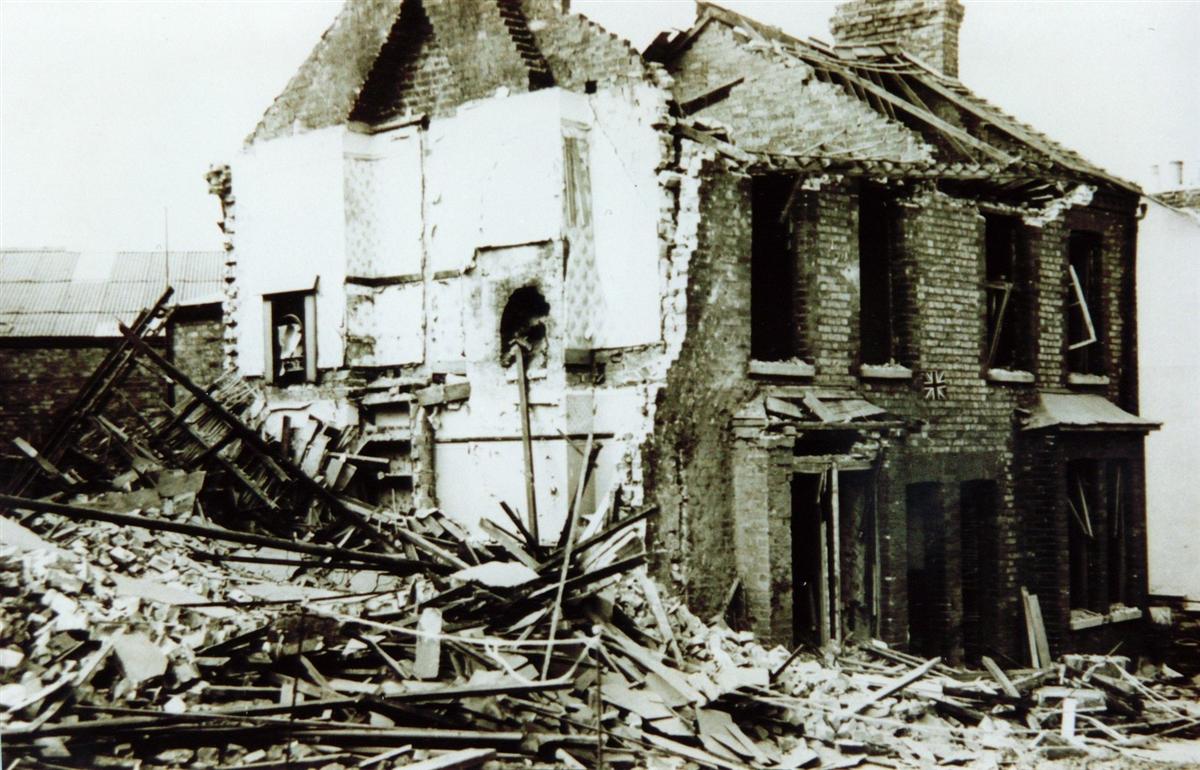
Denmark Road
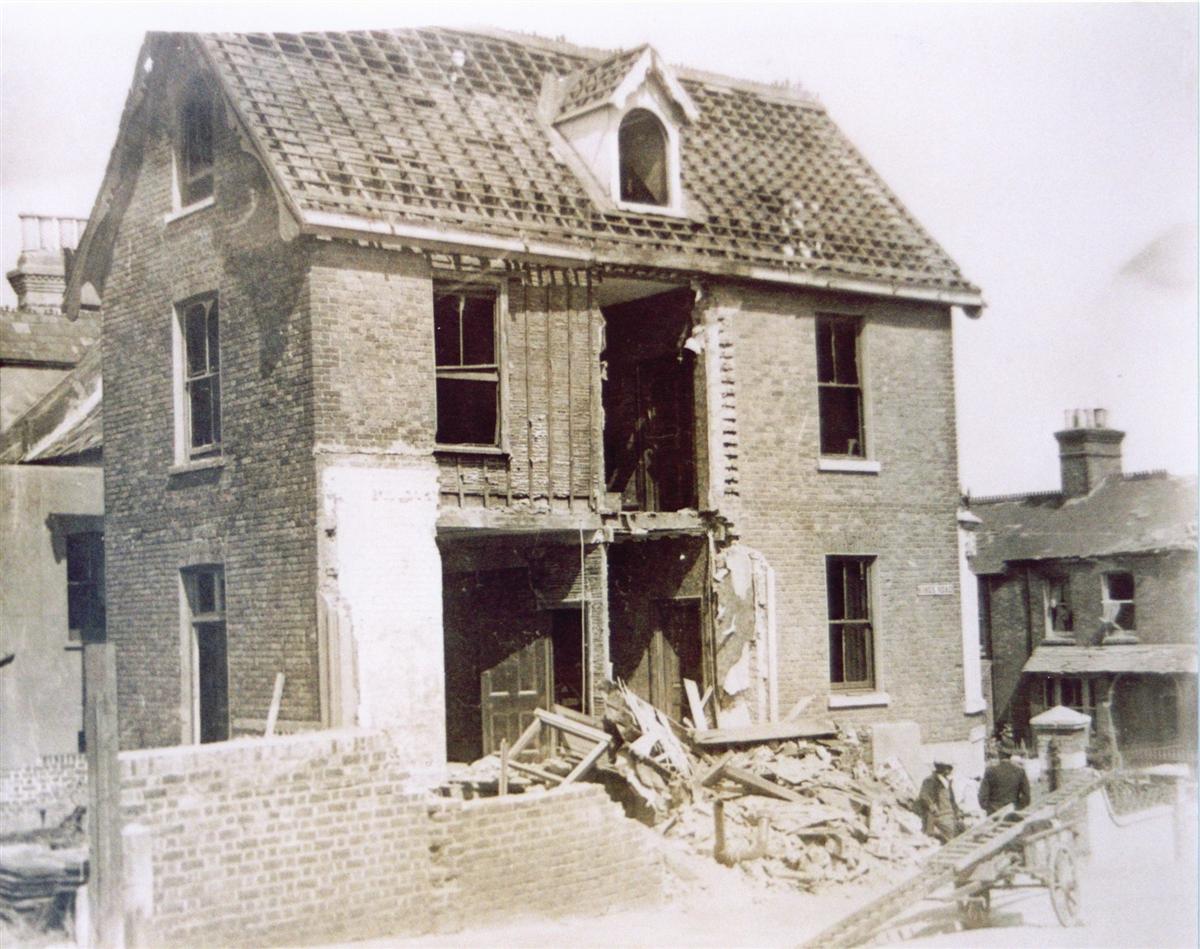
Kings Road
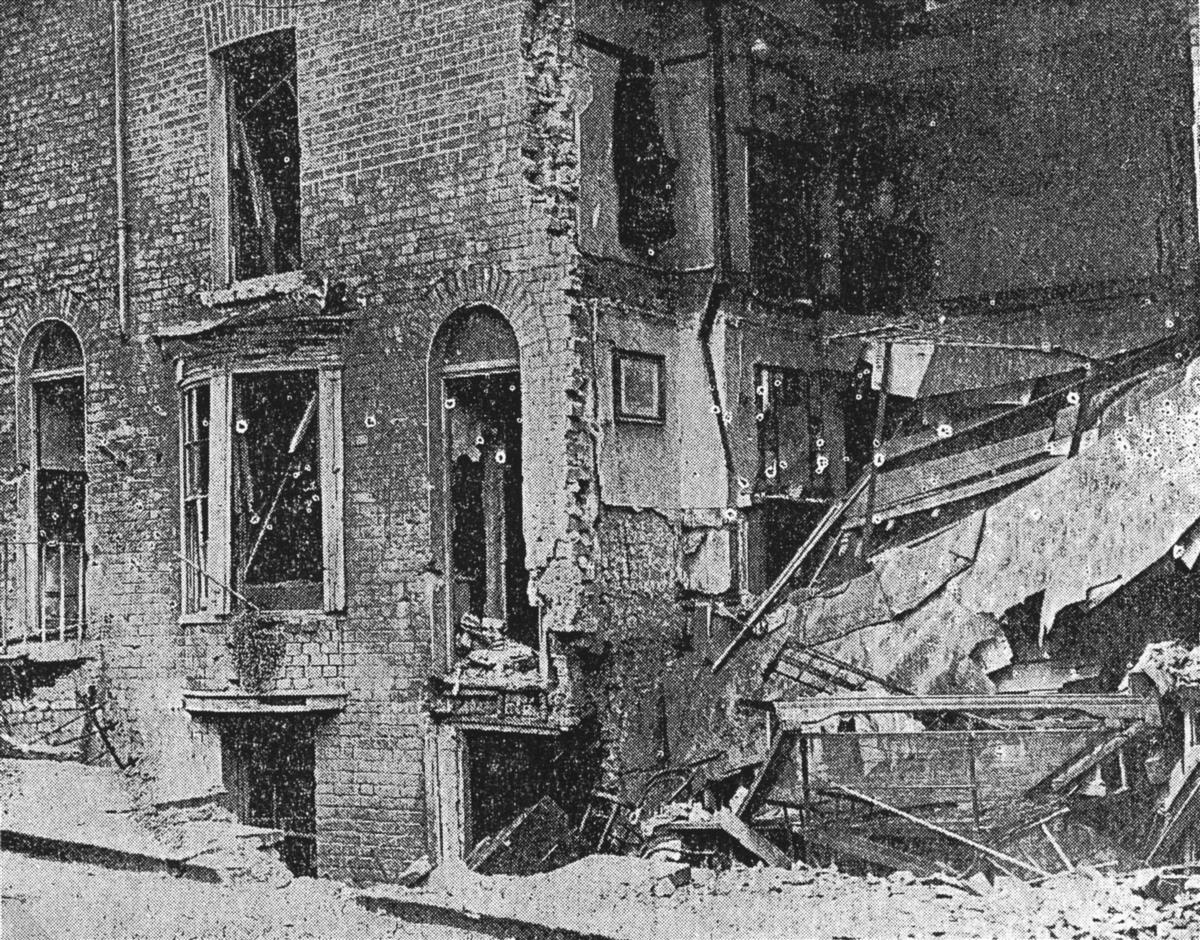
Sussex Street. Mr Frederick Thomas Plummer an Air Raid Warden was seriously injured and died at the hospital. Mr Plummer used to tour the district with a little green-grocerís cart. He was about to serve a customer outside a house when he was injured. His horse was also injured and had to be destroyed.
warning, but this time the bulk of the people were under cover, although the wardens, police and firemen were still busily engaged in their respective heroic duties.
Making a more systematic tour on Sunday, our representative first visited Sussex Street, where a number of houses were wrecked, windows smashed and walls marked by shrapnel and splinters. Pieces of broken iron railings and wooden laths from collapsed ceilings littered the roadway. One house, which was completely wrecked, was nothing but a heap of brickwork, and broken furniture. Chairs, linoleum, household utensils protruded pathetically from the debris. On the second floor, a washstand remained in position against the wall, although the flooring had collapsed the wash-basin was smashed the water jug appeared to be intact. On the walls a picture and an overcoat and hanger remained in position. Carved faces in the stonework over the doorways of several were untouched. The areas of all the houses were blocked with debris, and in one window a piece of curtain fluttered on a wire line. This street was also one of tragedy. Three persons were killed, a young man who dashed across the road, a miner who was in bed, and a fruitier who was hawking his goods in the street. His pony too was injured, and the cart damaged.
Along Hardres Street, many houses had the windows smashed, and at one place a mass of tangled wires hung over the roadway. Towards Boundary Road end of Hardres Street, masses of broken glass, bricks and woodwork covered the ground. The business sign of F.J.Pike Ltd, shop fitters, remained in position, but a part of the letter "J" was broken off. Practically the whole of the workshop was reduced to ruins. On the opposite side of the street a length of the Gas Works wall was spattered with shrapnel marks, but two road signs remained fixed to the wall. A top plate, however, was broken off. The "Seven Stars" public house was reduced to a mass of wreckage, but it was noticed that some pictures remained hanging on the walls in what was left of the bar.
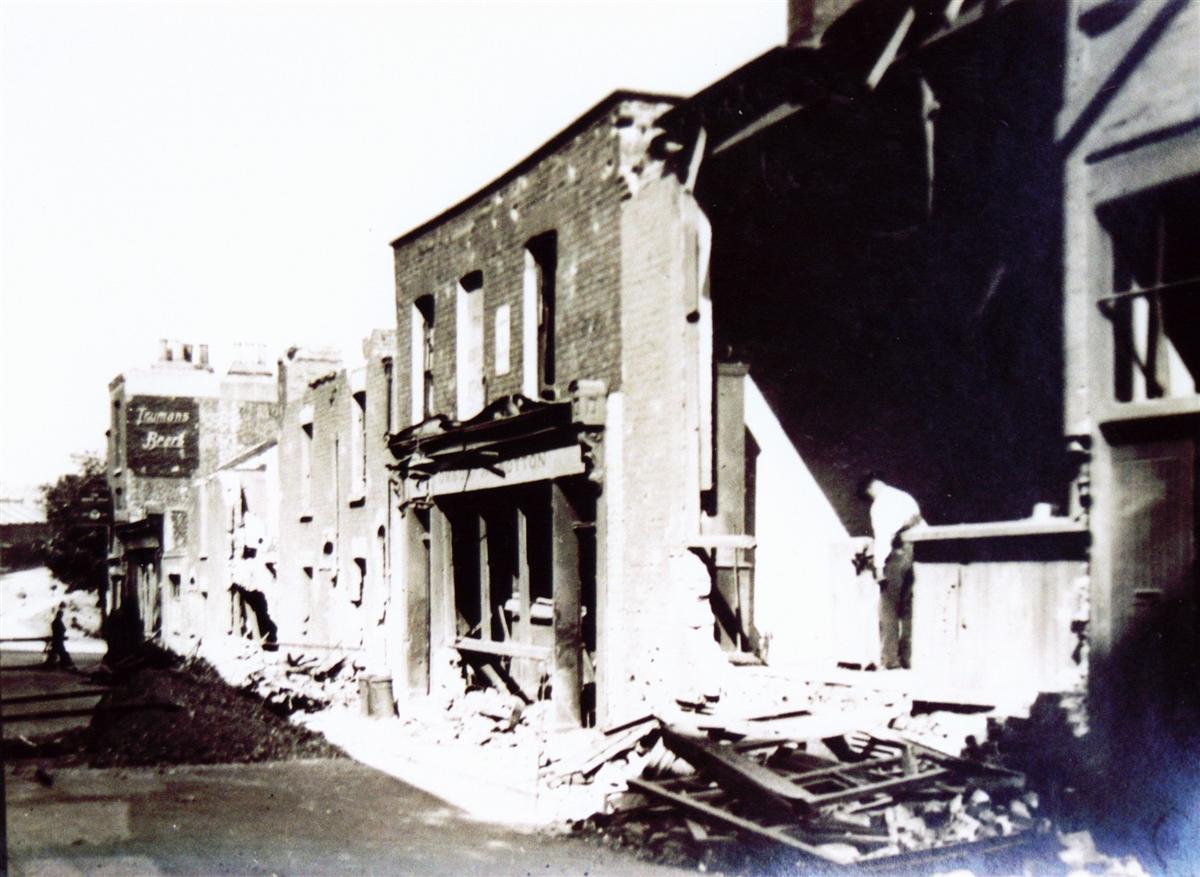
Hardres Street, Gas Works End. Among those who has remarkable escapes was Mr F J Pike. He was standing outside his premises, and attempted to get in as the raid commenced. The blast of a bomb which fell in the vicinity knocked him into the corner of the vestibule of his premises in Hardres Street. Practically the whole of his workshops were wrecked, but although Mr Pike was smothered in glass splinters, he was unhurt. Three of his employees, Messrs F Sherrington, Ron Ford and Ken Amos saved their lives by flinging themselves into the boiler room, while Mr Sherrington, senr., escaped by lying at full length in an alley at the rear of the premises. Seriously injured was Lewis Goodman, of the Seven Stars Public House.
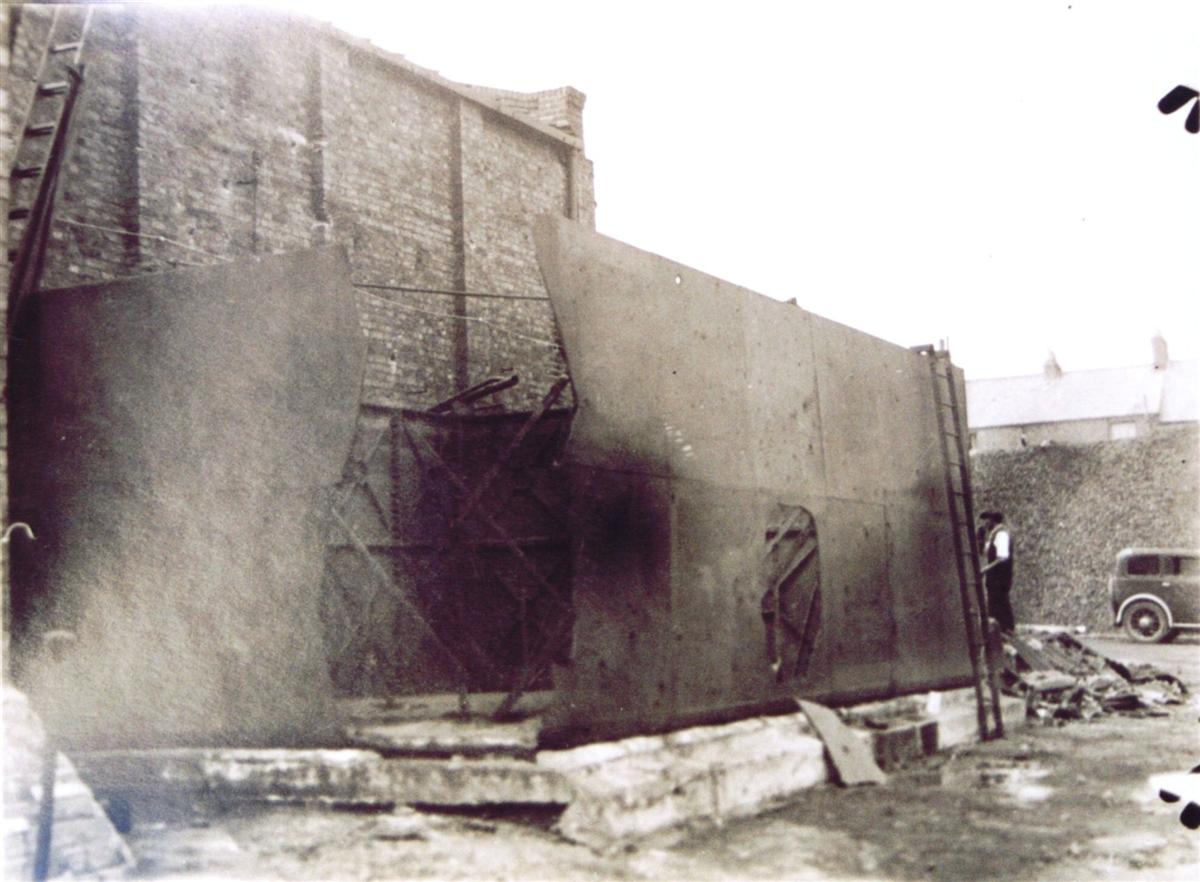
Gas Works
Of four jars of spirits on a shelf, two were smashed and two unbroken. The adjoining houses were wrecked, and another public house, the "White Swan" at the junction of Hardres Street and Boundary Road, together with a Timsoms coach station and garage were extensively damaged. The rear of the latter building had the roof ripped off, and the entrance was knocked out of alignment, the doors being twisted.
Extensive damage was done to the Gas Works, and incendiary bombs caused a fire which blazed furiously for some time.
In Church Road, Alma Road, and other streets, contiguous to Boundary Road, the windows of many houses were broken and several persons who remained indoors, unable to get into shelters were injured by blast and splinters.
Another area which suffered severely was at the top of Boundary Road and Chatham Street, where several bombs made deep craters in the roadway. Shops and houses got the full force of the explosion and several occupiers had narrow escapes as hearing the firing overhead, they dashed for safety. Mr. T. Joyce, who keeps a radio shop, told an "East Kent Times" representative that hearing the noise overhead, he called out to his wife to keep inside. As he himself was going from the shop into the living room, there was a loud explosion but the shop door being open, the glass flew outwards. The window was smashed and the interior of the premises damage, but Mr. and Mrs. Joyce escaped injury and soon afterwards rushed into a tunnel shelter. A bomb dropped twenty yards from the shop and made a hole in the roadway three feet deep. Another crater was made in the roadway at the top of Chatham Street, and in this vicinity property wrecked or damaged included the "Railway Tavern", the "Shakespeare", "South Eastern Tavern" and Dawson's Commercial Hotel, and private houses in adjacent roads.
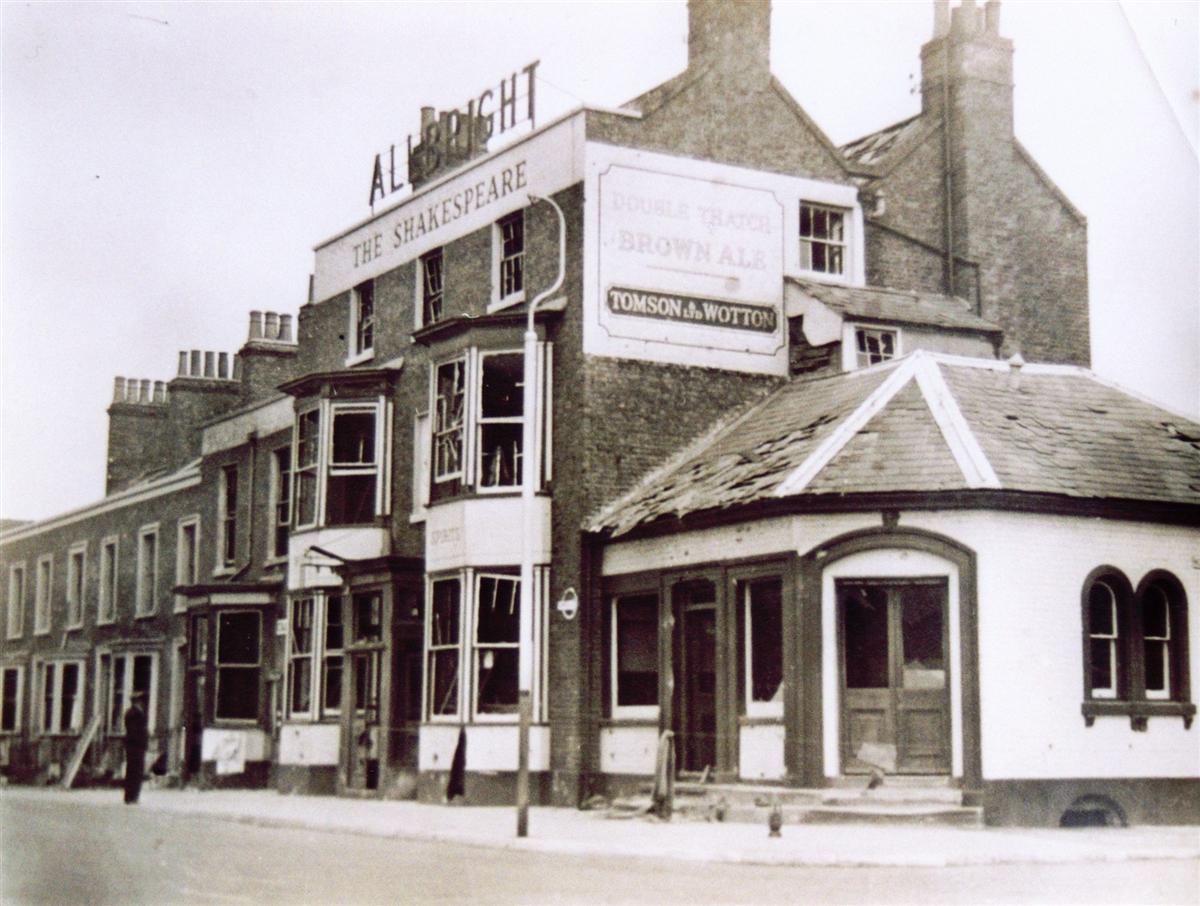
Margate Road
"Still home" were the words marked on a boarded-up window of a damaged house in St. Lukes Avenue. The house like many others in vicinity, was damaged externally and internally, windows being broken and ceilings knocked down. Sheets of corrugated iron which covered the windows were broken down, doors twisted off their hinges, slates dislodged and walls demolished.
Several houses were reduced to ruins, and the roadway in which a bomb had made a large crater was littered with debris. The windows of a row of shops and those of the "Derby Arms" were shattered, and in Central Road, Princes Road and Hillbrow Road and Newlands Road property was severely damaged. Another road which suffered extensively, where perhaps the devastation was most heartrending, was Woodford Avenue. Several houses were completely demolished, others were severely damaged, but curiously enough, a pair of Council houses, outside which a bomb had made a deep hole in the roadway, escaped with little damaged. Even the windows remained intact. A few yards away the results were the opposite, houses having the appearance of being sheared from their neighbours. One curious effect was that a glass shade over a gas bracket was undamaged. Another bomb fell in the front garden of a bungalow in Margate Road causing a deep crater and damaging property over a wide area.
The five pictures following are all of Woodford Avenue.
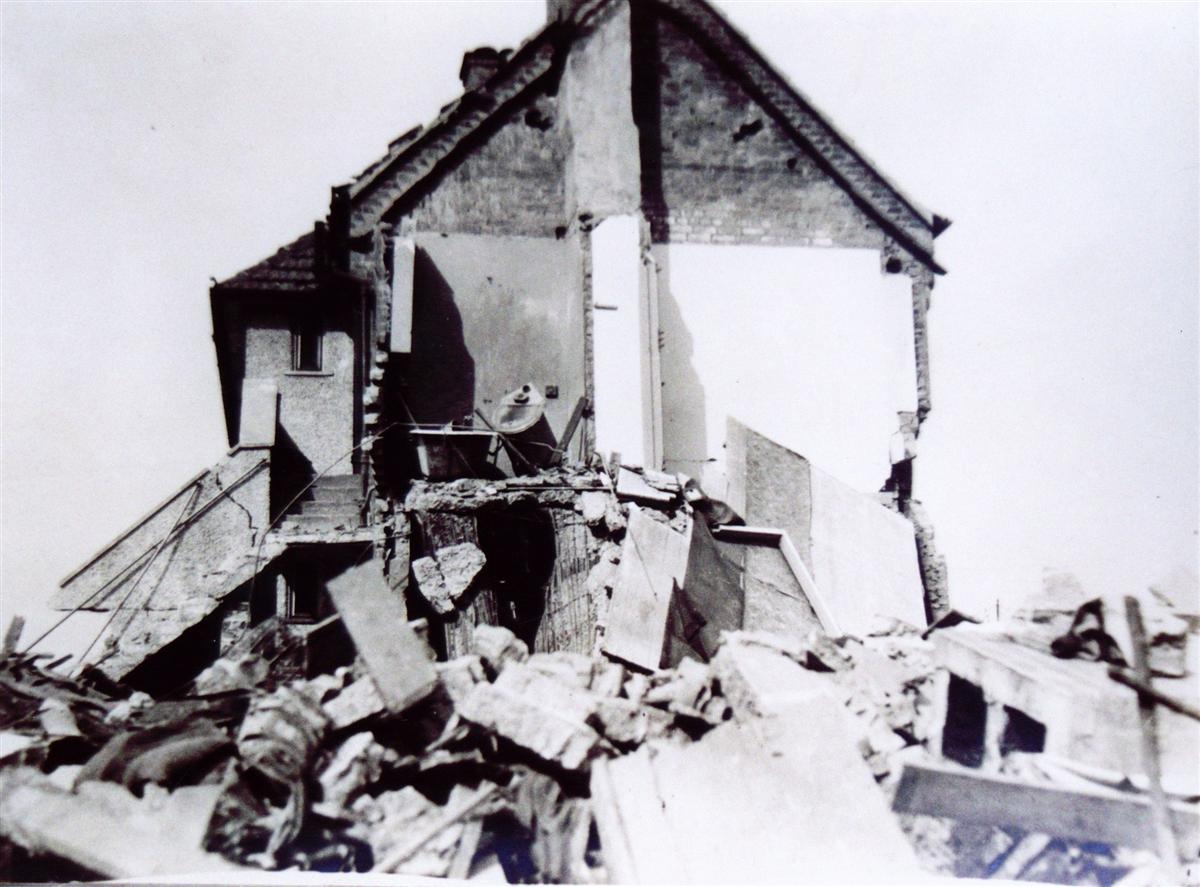
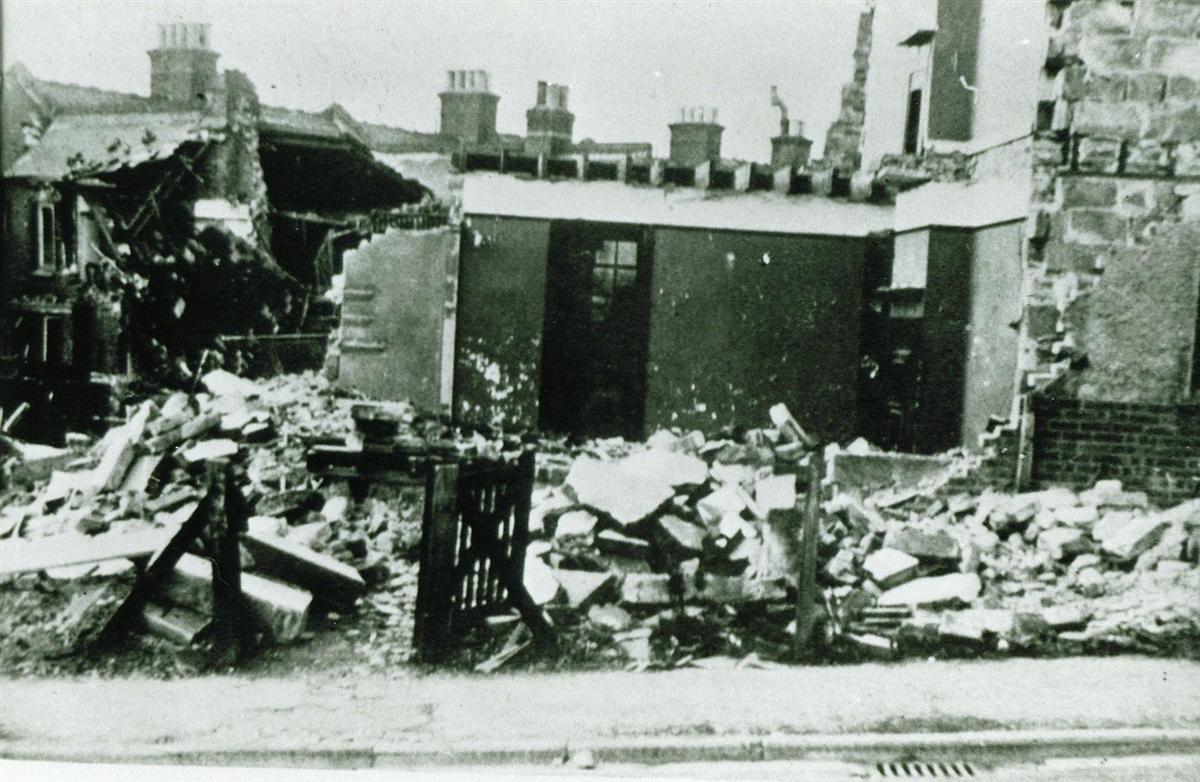
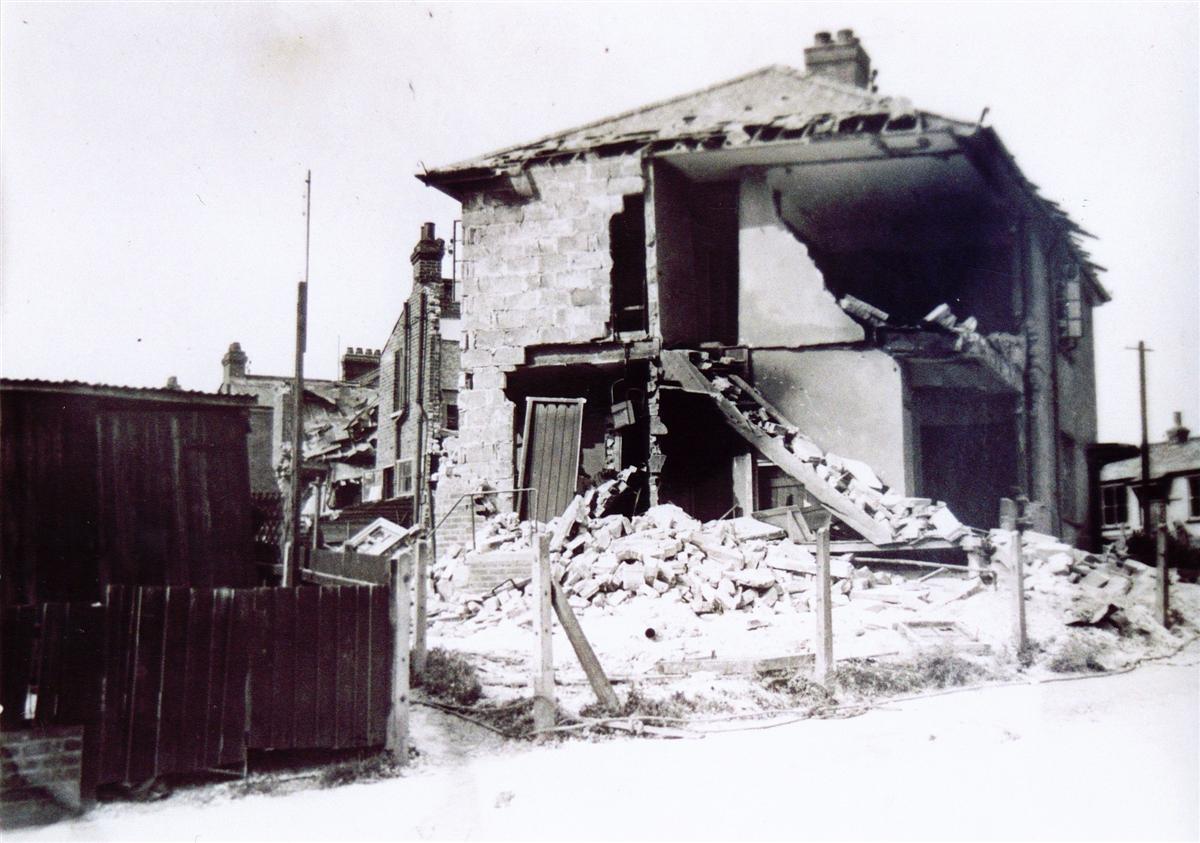
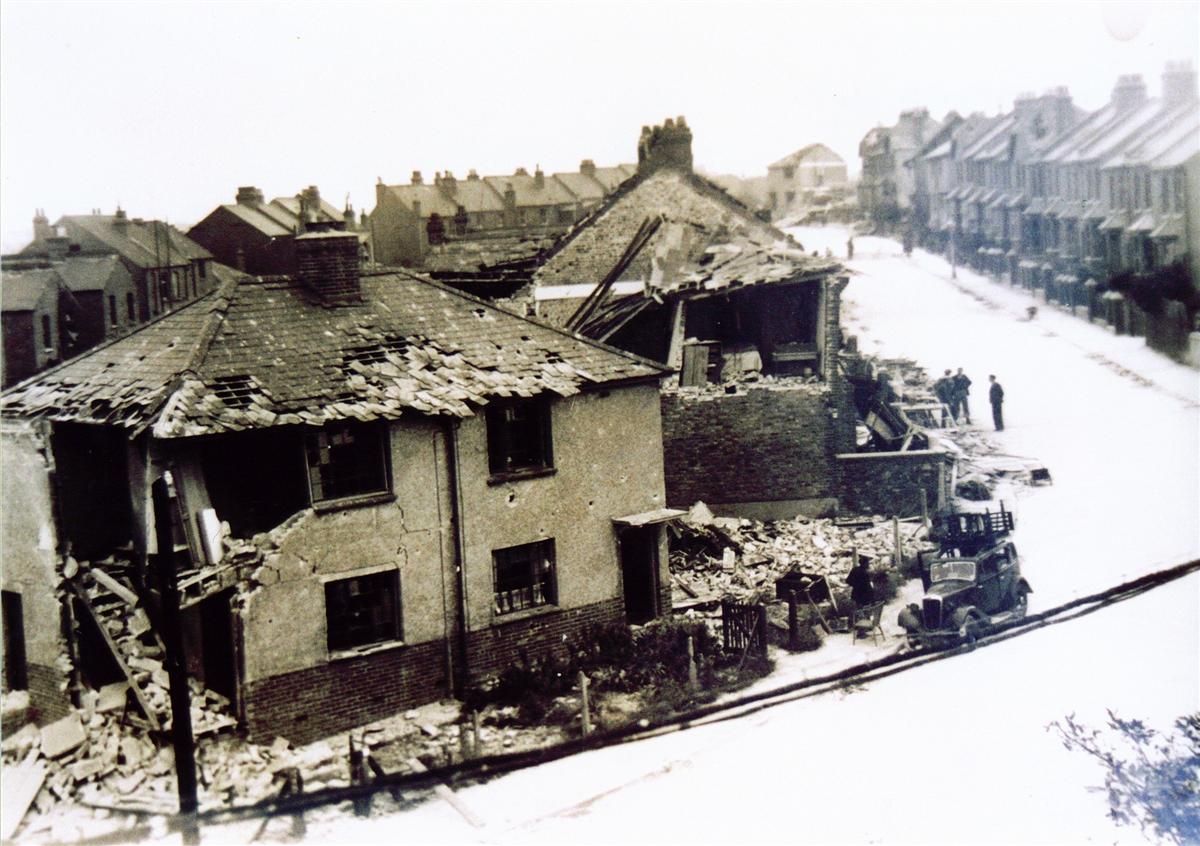
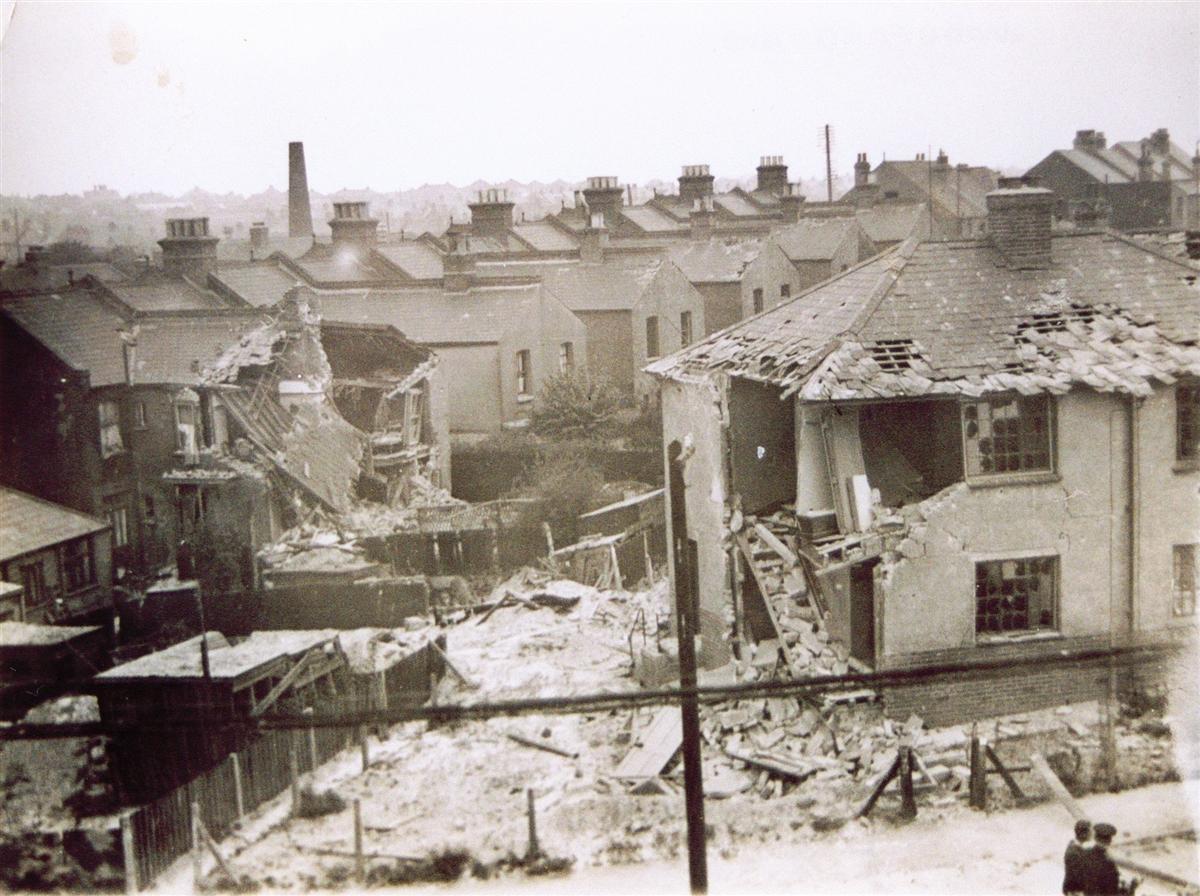
Charles Stephen Wesley, age 16, of 22 Woodford Avenue was killed at 8 Woodford Avenue
This series of three pictures show the area between St. Lukes Avenue and Boundary Road the arrows mark the Primitive Methodist Church in Denmark Road making it easier to get your bearings in the chaos and destruction.
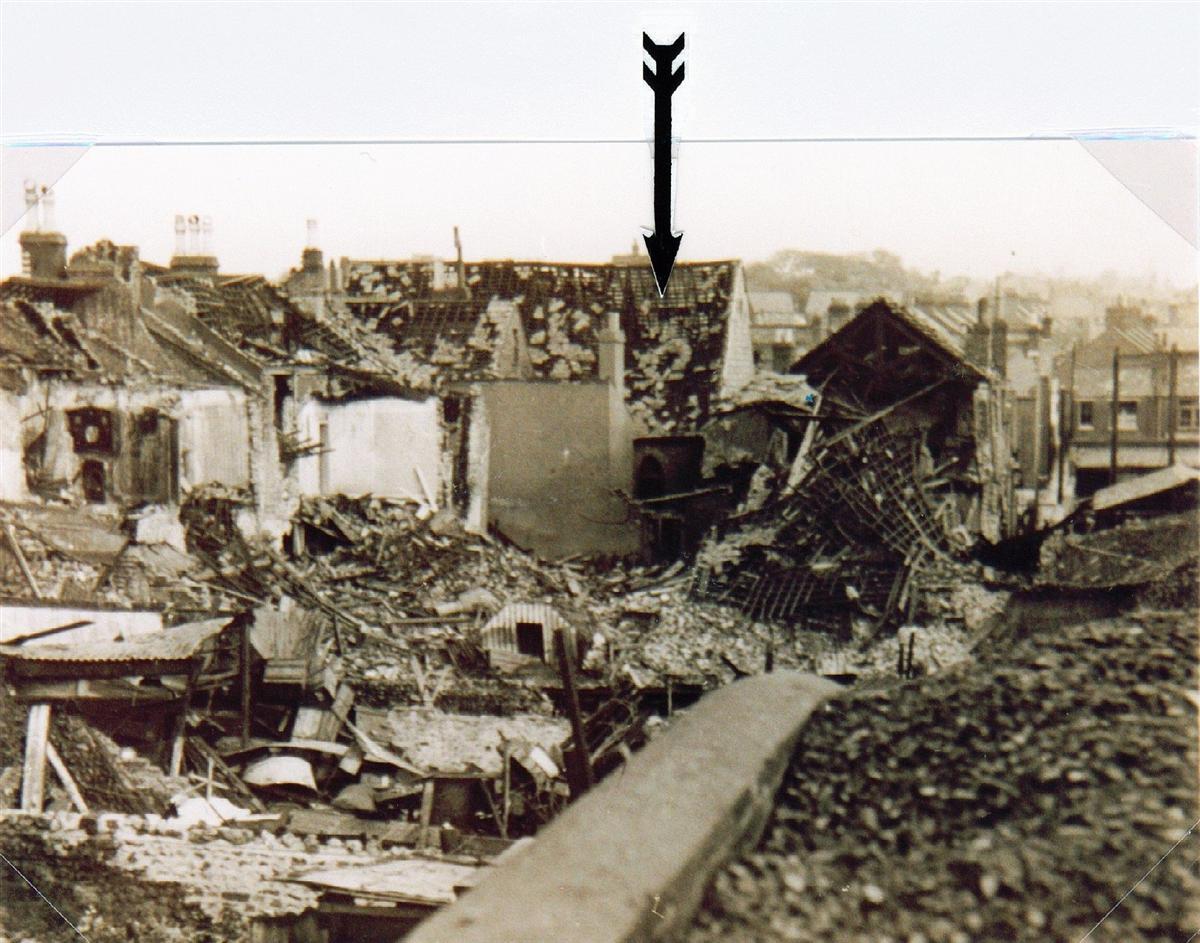
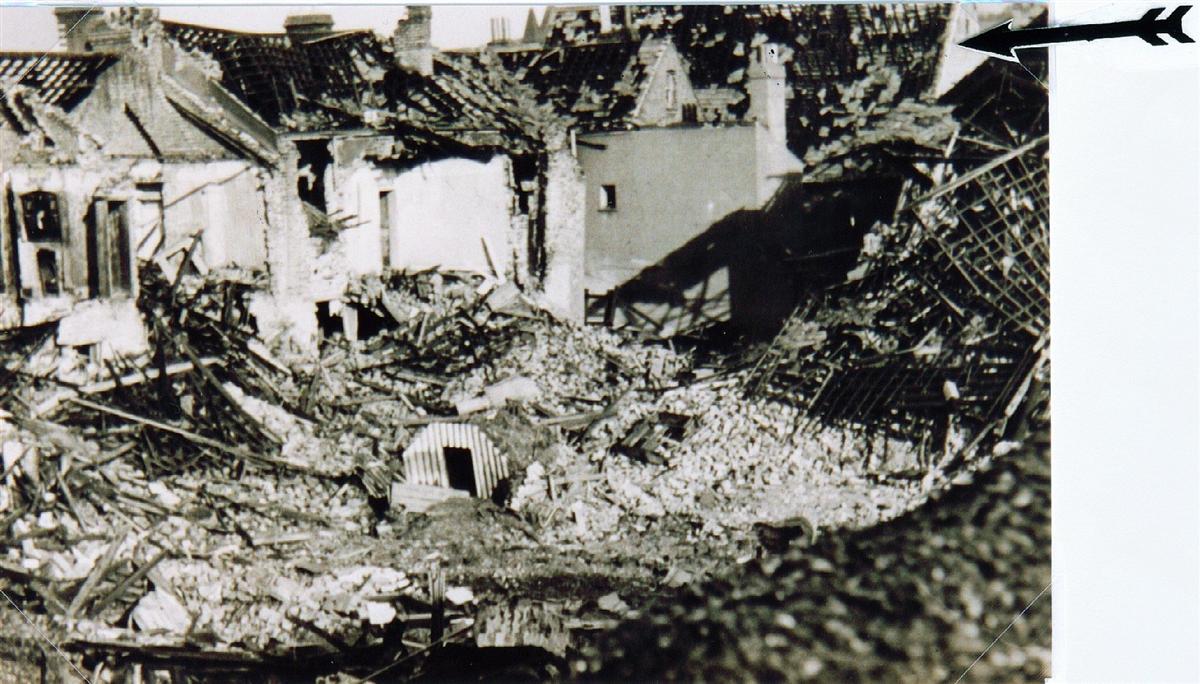
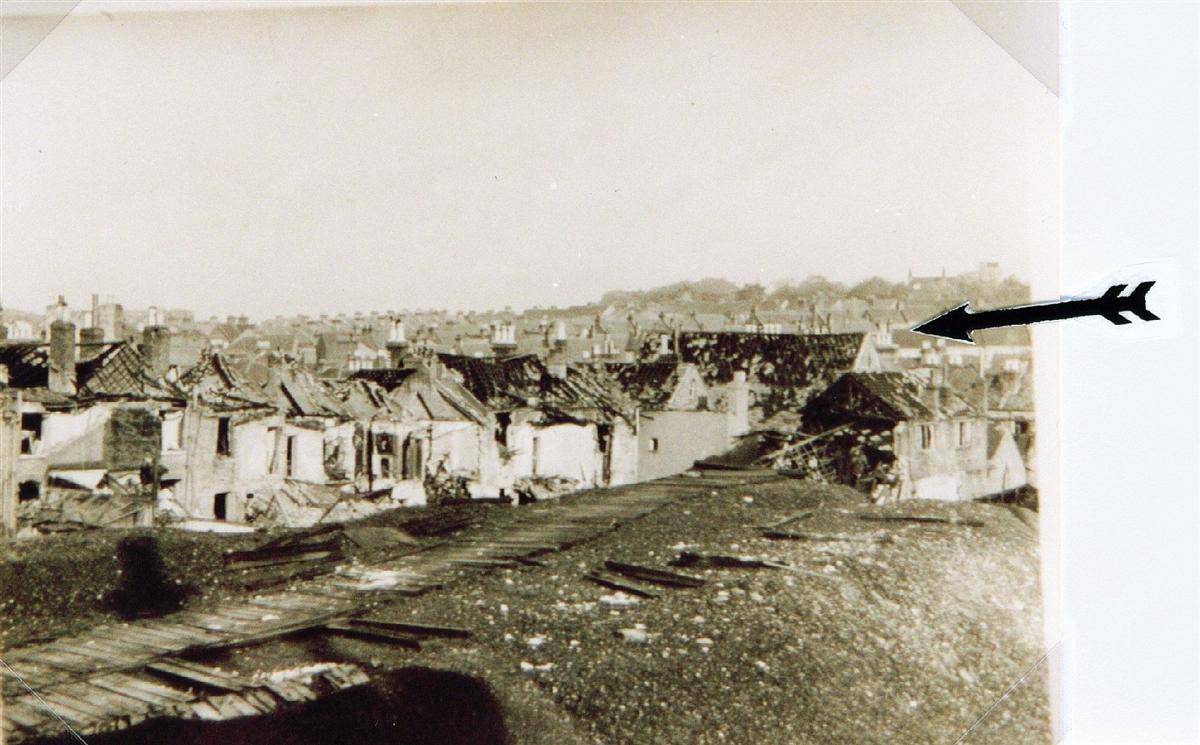
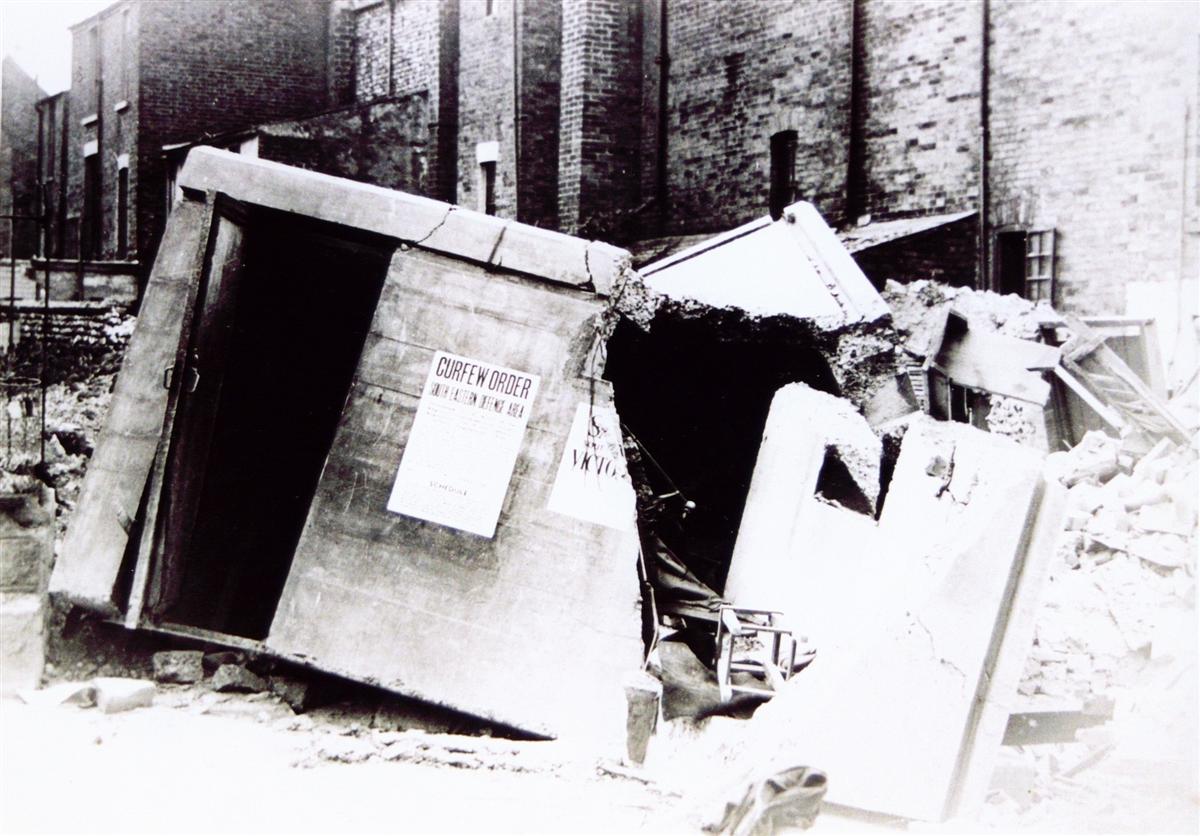
Camden Square Wardens Box
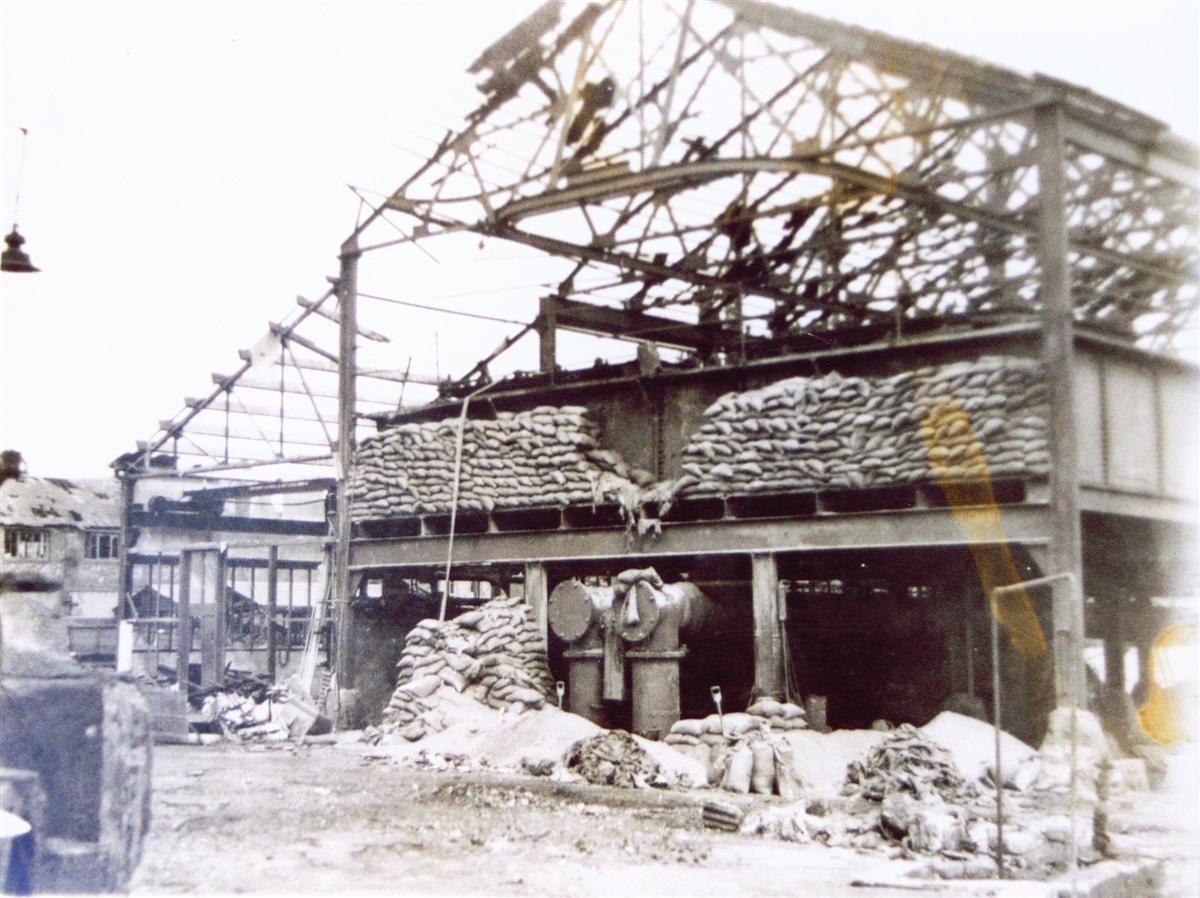
Gas Works
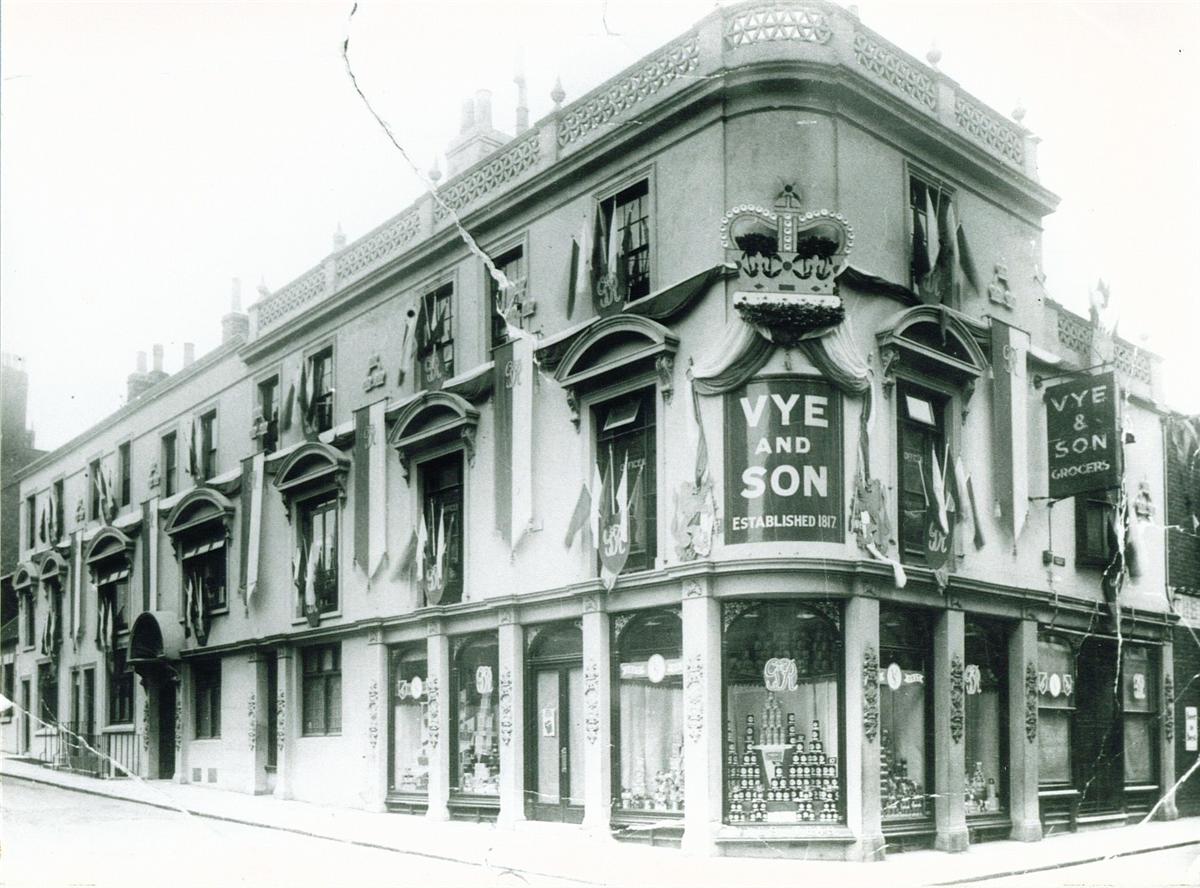
Messrs Vye's premises, Queen Street
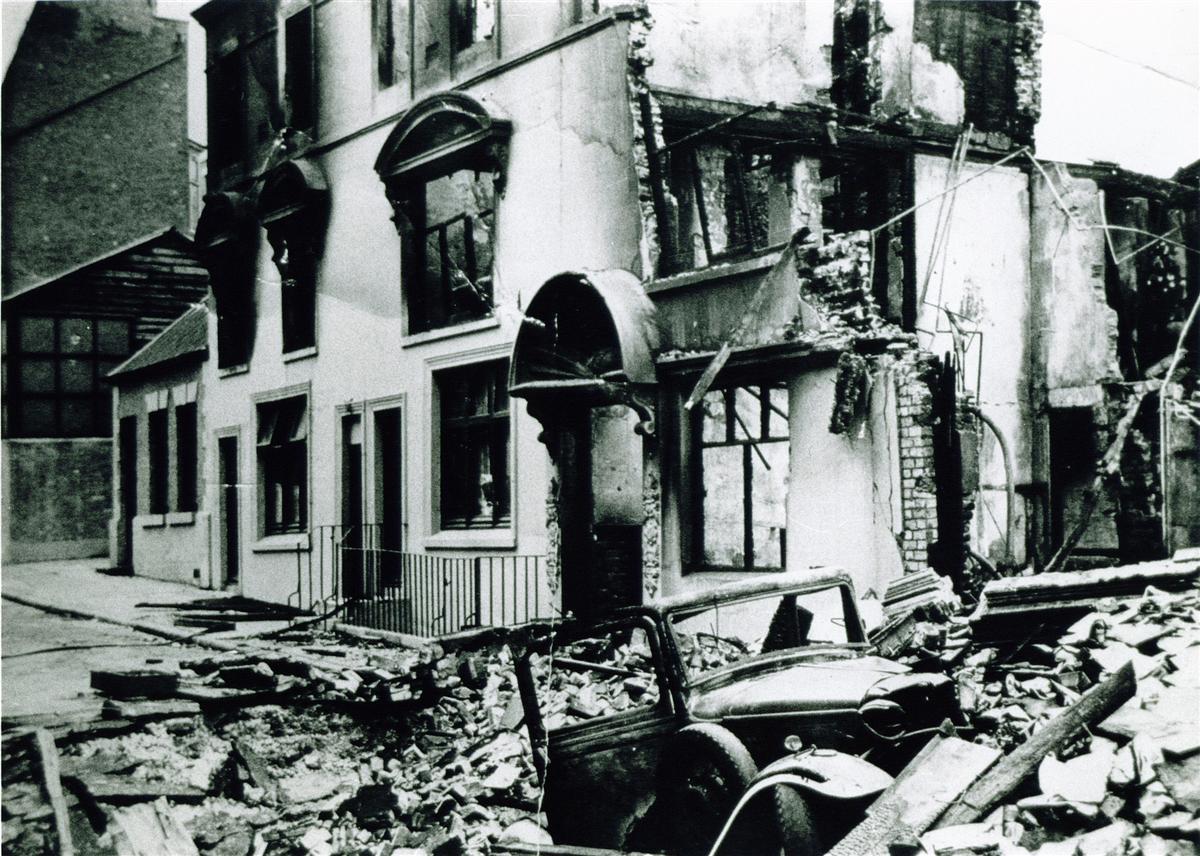
Vye's premises after the Raid, Queen Street. Milers Wrigley was killed outside Vye & Son.
Invaluable work was performed by a detachment of naval ratings which did much to relieve the difficulties of the local authorities, especially in respect of the fire at Vye's premises.
Within a few yards of Messrs Vye's shop in Queen Street, a milkman was putting his horse into the stable. Although a bomb fell within a few feet of them, both the pony and the milkman are safe.
Wife of a well-known newsagent of the town, Mrs. C.E.Lilley lost her life because she waited to serve a customer before locking up her shop. She was about to seek shelter when the bomb fell. The customer was seriously injured, but a newsboy who was helping in the shop escaped. Mrs Lilley's funeral is to take place on Thursday afternoon at 3 o'clock. The cortege will leave the premises of Mr. Leet, newsagent. No. 97, Boundary Road, Ramsgate.
A house in Alma Road which was damaged was, by a curious coincidence struck by a shell during a bombardment in the war of 1914-18, and a Mr. Hobday lost his life. On this occasion blast damaged the same room, but the house is at present unoccupied.
On Saturday afternoon a man presented himself at the post office, and asked whether there would be any late delivery of letters that day. "Certainly," said the post office official. "Well," said the caller quite calmly, "If you have any letters addressed to me you had better give them to me now. It is useless trying to deliver them, because my house isn't there.
Outside the wrecked assembly rooms was a board bearing the following inscription, "Brother man, don't stay outside and hope for the best. Come inside and get it."
With a small torch and hurricane lamp as illumination in the tunnel, an ambulance worker gave first aid treatment to a man and a young girl who received wounds from glass splinters.
A man was being shaved at a barber's shop when a bomb exploded in the vicinity. Both barber and customer took cover until such time as they could reach the tunnel for greater safety. Both were uninjured.
When a bus travelling on a county road was machine-gunned by an enemy plane, the conductor sheltered under the staircase and the passengers lay on the floor. Bullets dented the ironwork. Stopping his bus during the air raid, a conductor took a girl, the only passenger, to shelter. When he returned he found the windows of the vehicle smashed.
Twenty-three years ago almost to the day, Ramsgate suffered in the worst daylight raid of the 1914-1918 war.
One Ramsgate couple were about to sit down to their mid-day meal when the bombs started to drop. On the table was a meat pie. The ceiling came down on the meat pie, so that was written off a dead loss. But stewed plums and custard, which were in the larder, escaped. So the couple made their meal of bread and cheese, stewed plums and custard.
Alderman W. T. Smith, after escaping death by the skin of his teeth when he was near Albion House, returned home to find that his residence had been wrecked, fortunately Mrs. Smith was away.
Ten yards away from where the bombs dropped in Albion Place, a budgerigar was hanging in his cage on a veranda. After the dust had settle, he was heard still merrily whistling. Although he was completely buried in debris from Camden Square, Mr. Blackburn, of Messrs W. P. Blackburn and Son, King Street, escaped with a shaking.
Mr. George Parkes, a Gas and Water Department employee, owes his life to the action of a friend, Mr. Gibbons. Mr. Parkes was about to bolt for a shelter in the wake of two other men. Mr. Gibbons, crying out that it was too late, dragged him back under a work bench. The two men running for the shelter were killed, but Mr. Parkes and his companion were saved.
Mr. Charles Hesketh, of the Railway Tavern, was peacefully serving in his bar, "Suddenly", he said "the door was blown completely off its hinges and crashed against the counter". This, Mr. Hesketh thinks, undoubtedly saved him from injury, for although the bar was wrecked, he escaped unhurt.
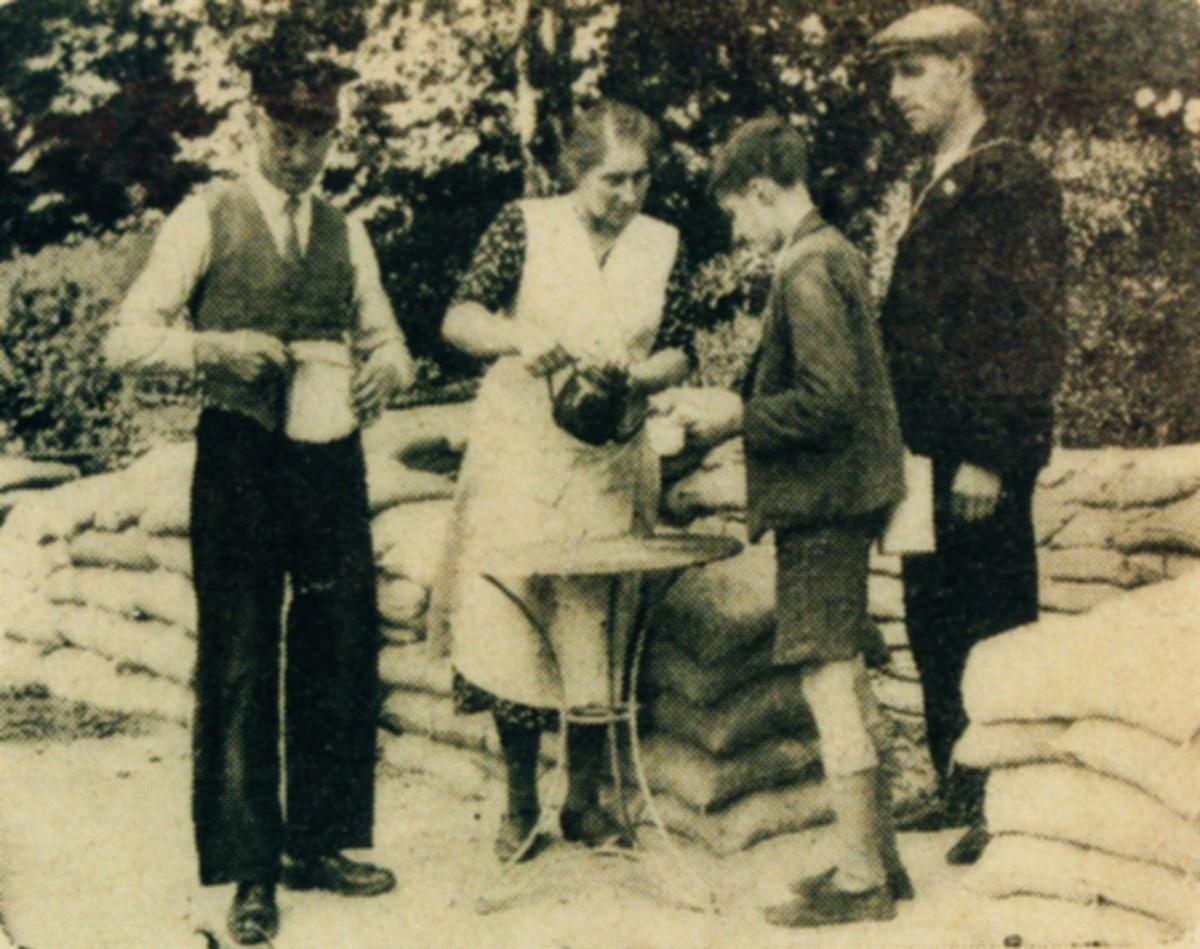
Ellington Park - Park Keepers Wife Serving Tea
One cannot emphasise too strongly the good work of Park Keeper Mrs. Griggs, who have been untiring by day and night in their efforts to make comfortable those sheltering in the neighbourhood of Ellington Park. A number of persons rendered homeless were provided with alfresco meals to which residents contributed materials and service. The irony of the beauty of the park this year and the desolate folk fore gathering there amid sylvan attractions was painful.
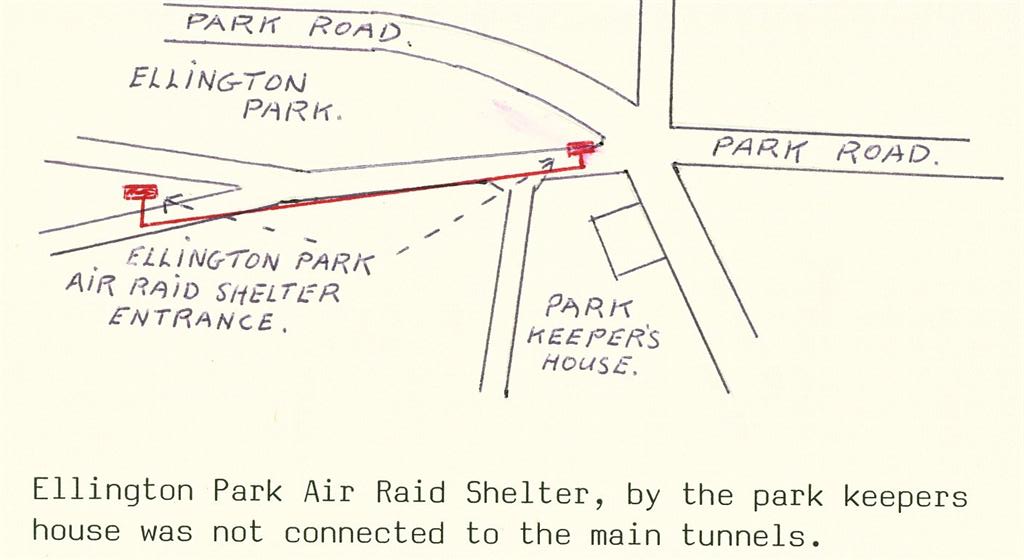
Ellington Park Air Raid Shelter, by the park keepers house was
not connected to the main tunnels
Unquestionably a very large loss of life was avoided by the insistence on the part of Messrs, Vye and Son that their premises should be cleared during an air raid, and that all the members of their staff should take shelter. It was while standing near the shop that Mr. M.W.Leach lost his life.
A woman of 83, who was dragged from the cellar of a wrecked house, complained bitterly that she had lost her false teeth. She was slightly wounded in the head.
Mr. C.S.G.Spencer, who lives in Stanley Road, returned home to find his house severely damaged, but a canary and a dog still alive and quite happy. "How they had missed being blown to pieces" said Mr. Spence, "I cannot understand".
A baker's roundsman left his van outside a customer's house and ran for shelter. When he returned, both the house and the van were a heap of splinters. To his surprise, however, the customer and his wife crawled out of the wreckage unhurt. But the bread did not escape.
Mrs. Dark an elderly resident who lives in Margate Road, was out at the time and took refuge in a tunnel shelter. When she arrived home she found that her house had been badly damaged, and that her dog, "Floss," had been buried in the debris. A rescue squad soon got to work and dug the dog out unhurt.
A few birds of the canary type, evidently released from their permanently wired homes, were to be seen at liberty, which had come to them with such alarming methods. Sparrows, as casualties, were common, and the domestic cat fell victim in several areas.
One victim of the raid was Mr. Joseph Tuckley, a one-legged man who was an air raid warden. He was crushed to death when the porch of a house under which he was sheltering collapsed. His wife is among the missing. (Mrs. Rose Tuckley was also Killed).
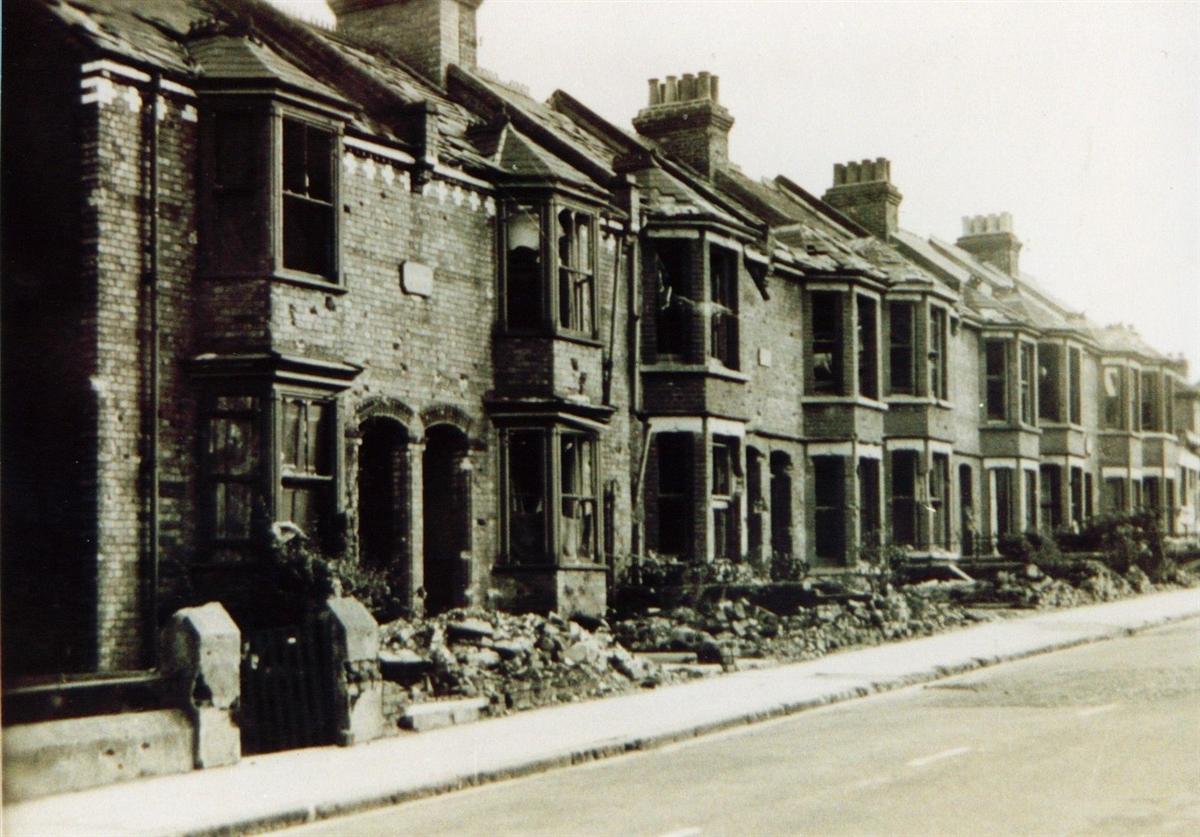
Margate Road
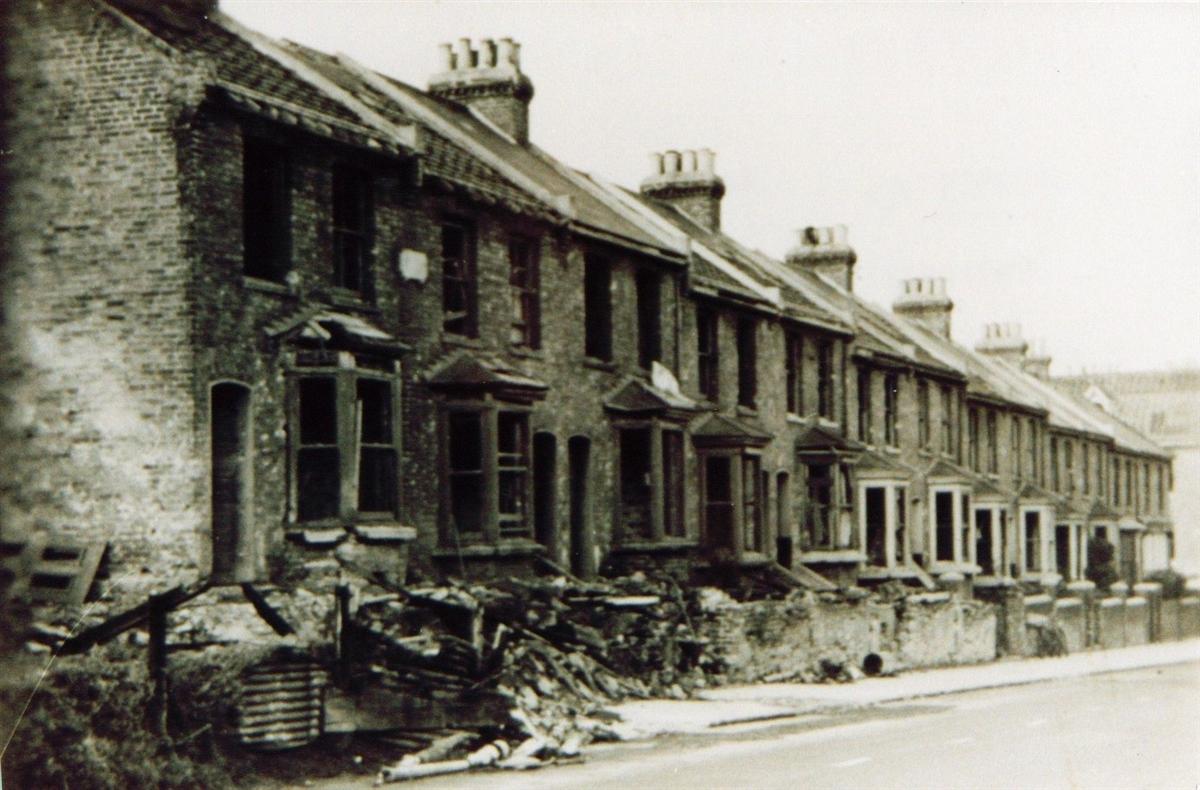
Margate Road, first row of houses past Hudsonís Flour Mill to Kingís Road.
The next day (Sunday) Mr. George Peete, the baker opened the bakery and cooked any roast dinners for the people living nearby. The town was without gas for a few days.
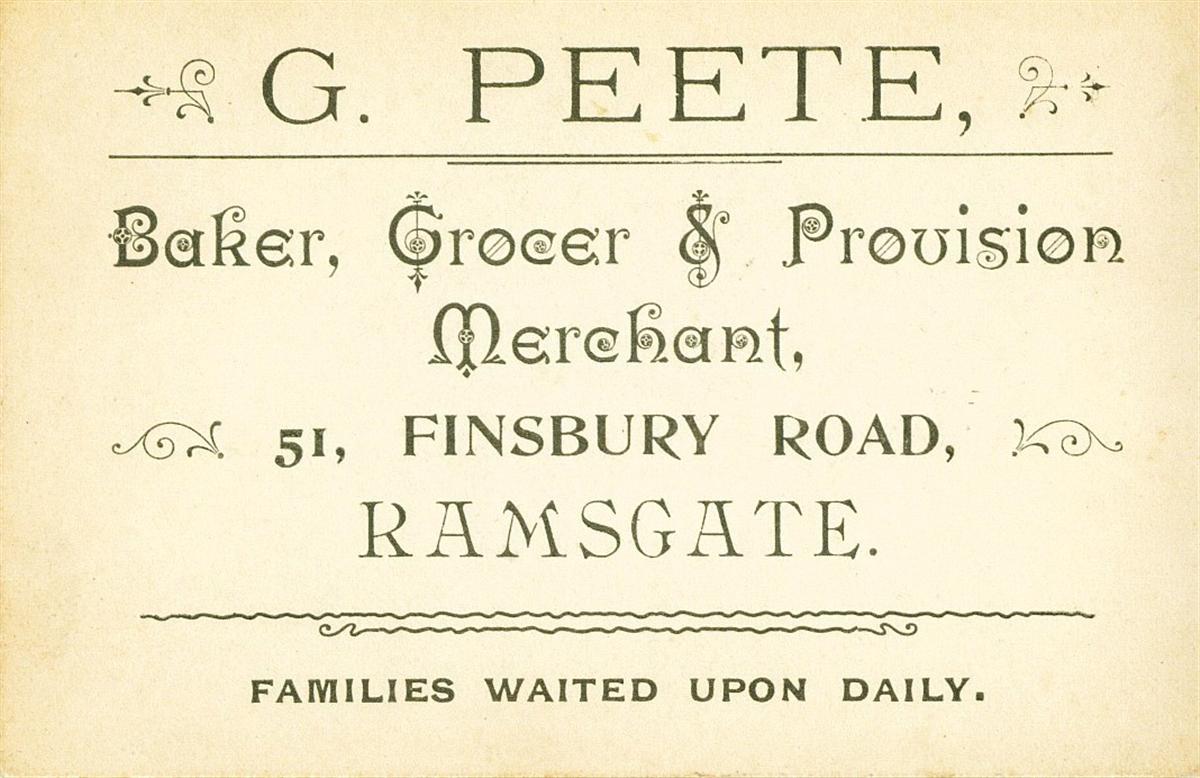
3,000 MEALS, SERVED TO THE HOMELESS.
In twelve days six primus stoves cooked nearly 3,000 meals for the people of Ramsgate rendered homeless in the great air raid. Seven months ago plans were made for such an eventuality and the premises formerly occupied by the Constitutional Club were earmarked as the headquarters. But what could not be foreseen was that when the catastrophe came there would be no gas, no electric light and no water in the building for two days. That all those difficulties were overcome was due in a large degree to Mr. J.E.Woods, Relieving Officer for Ramsgate, backed by a stout body of helpers. Having been in Ramsgate for twelve years. Mr. Woods know almost everyone who went to the club for help but what is perhaps more important, he held the rank of company quartermaster sergeant in the Great War, and what a quartermaster does not know about supplies is not worth knowing.
After what Mr. Knickerbocker has described as the "worst raid in history," Mr. Woods opened the club premises at 1.30 p.m. on 24, August. Up till 11 p.m. last Wednesday, when all wants had been satisfied, 2,910 meals had been supplied to homeless people and there had been 879 "sleepers". On the heaviest day the Saturday of the raid a total of 325 meals was served and 140 people were accommodated for the night in the building. Mrs. C.J.Sutton and the members of the Womens Voluntary Services came to Mr. Woods assistance and a tremendous amount of hard work was put in day after day by Councillor T.W.Mockridge. In addition, recipients themselves assisted tremendously by doing the washing up and cleaning of the premises.
A GOOD MENU.
The meals provided for the homeless were often much better than those which the helpers were able to secure. For instance, breakfast there might be pressed beef or fish, bread and butter, hot tea, and for the children hot milk, crisps and biscuits. For dinner there would be soup, meat, beans and stewed apples or plums and custard. There was a substantial tea with meat and cheese and again special fare for the children. Many of the homeless people had also lost their clothes and one man arrived without a shirt and with only one leg to his trousers. The American Red Cross gave sixteen bags of clothing and these were distributed by Mr. Woods and the women of the W.V.S. First of all distribution took place at the club but this section of the work was after a day or so transferred to No. 3, Rose Hill, where ablution rooms were also provided. Working on the Army plan, section leaders were appointed from among the recipients and they helped tremendously in effecting the smooth working of the great undertaking. The Public Assistance Committee responded splendidly to all demands made upon it by Mr. Woods. Mr. John Moss, the Public Assistance Office, who paid a visit to the club to see how the work was progressing, despatch 300 beds and 500 blankets from Maidstone and saw that food supplies were adequate. Supplies arrived both by day and night, and members of H.M. Services assisted in the unloading. The greatest tact had to be used in dealing with the homeless for many of them were very naturally, in a highly nervous state. The first thing was to make them feel at home and this was done in a very thorough manner, they were then interrogated by Mr. Woods and passed on to Assistance Board Officers, working in the same building, who made grants for the purchase of new furniture and effects. The homeless were then put in touch with the Town Clerk (Mr. H.G. Curtis), the Borough Treasurer (Mr. H.Oliver Jones) and members of their staff, also working on the premises and they were kept busy arranging for new homes and the transport of any furniture which had been salvaged in Corporation vehicles.
MEALS ALL ROUND THE CLOCK.
The conditions were made more difficult by the succession of air raid alarms and although regular meal times had been fixed it was not often they could be adhered to. In fact, for the whole of the time the club was open meals were served almost 24 hours a day. Those who were able went to the tunnel during the alarm but between 40 and 50 were to old to make the journey and were cared for on the premises. A cup of tea and a cheerful word kept them in good spirits and free from fear. The work extended to beyond headquarters, for the homeless who had gone to the tunnels for shelter had to be provided with food. This was sent to them and the work in the tunnels was capably supervised by Mrs. Woods.
A mobile canteen provisioned from the club was operated by the W.V.S. During the day time the large upper hall was used as a dining-room and at night it was converted into sleeping quarters. Sleeping quarters were also provided in the large room downstairs. Mr. Woods was on the premises from five o'clock in the morning until midnight, and was frequently called out between times. And now he has one request to make. A number of blankets are missing. They were loaned to people who were hastened to the tunnel for shelter. Will anyone who might be in possession of one of them please return it to Aberdeen House, Ellington Road.
H.R.H. THE Duke of Kent paid quite a long visit to Ramsgate on Thursday (29, August). Arriving at Ramsgate, the Duke who was dressed in Air Force uniform and was driving his own car, met by the Mayor (Alderman A.B.C. Kempe) the Deputy Mayor (Councillor A.R. Young) the Chaplain (Rev. C.R. Farnsworth) the Town Clerk (Mr. H.G. Curtis) the Borough Surveyor (Mr. R.D. Brimmell) the Chief Constable (Mr. S.F. Butler) and other borough officials.
He then made a tour of the most heavily bombed areas in the town. Although he drove from point to point. H.R.H walked along the streets and chatted with the groups of residents which he met. Most of the damage in the town is in working class areas, and for nearly an hour H.R.H. was in the poorest part of the town.
On many occasions his short talks with those who had been bombed out of their homes he expressed his deep sympathy with them and his admiration of their terrible ordeal. He was evidently greatly impressed with everything that he saw. Among the places he visited was a works, where he spoke to William Carey, one of the employees, who told the Duke that although the works had been bombed they were still carrying on. He had quite a long chat with a little group of women, Mrs. A.M. Coleman, her daughter Hazel and Mrs. Plummer, Mrs. Coleman, whose husband is serving with the Marines, had her shop damaged, and the Duke was very interested in the effect the air raids had had on her business. He sympathised with her and also with Mrs. Plummer, whose home had been bombed. Afterwards the Duke told the Mayor that he thought the people of the town were very brave and courageous.
REST CENTRE STATISTICS.
Ramsgate had 8 Rest Centres, accommodation for 1,300 people. The Rest Centres were used 18 times. Number of people served 4,243.
THOSE WHO LOST THEIR LIVES.
Adams, Frank William, age 54, of 30, Hertford Street.
Birch, William, age 16, A.R.P. Messenger, of 24, Cannonbury Road.
Boxall, Catherine Ann, age 68, of 67, Margate Road.
Brown, John, age 19, of 20, Sussex Street.
Chantler, Albert Henry, age 57, of 109, Winstanley Crescent.
Cooper, Sidney, age 49, of 15, Camden Road.
Farley, George Edward, age 53, Air Raid Warden, of Highfield. West Dumpton.
Gifford, Albert Richard, age 59, of 1, Paradise, off the High Street.
Haggis, James Reginald, age 16, of 57, Winstanley Crescent.
Howland, Ernest, age 52, Air Raid Warden, of 18, Salisbury Avenue.
Jones, Thomas Arthur Ronald, age 26, of 5, Sussex Street.
Katler, Sarah, of 4, Camden Square.
Kember, Benjamin, age 31, of 16, Margate Road.
Kember, Mary Elizabeth, age 31, of 16, Margate Road.
Kember, Brian Benjamin, age 3, of 16, Margate Road.
Leach, Miles Wrigley, age 46, of Dhoon, Rumfields Road.
Lilley, Ivy Doreen, age 42, of 15, Margate Road.
Morris, Alfred George, age 51, of Kenwood, Hollicondane Road.
Newland, Albert Edward, age 39, of 9, Salisbury Avenue.
Page, Phillip John, age 26, of 76, West Dumpton Lane.
Plummer, Frederick Thomas, age 56, Air Raid Warden, of 1, Belmont Road.
Roddy, Cornelius, age 15, of Rosary, Vale Square.
Rowland, Gladys Joyce May, age 20, of Doric House, Westwood Road.
Ticehurst, Frederick Charles, age 36, Police Constable, of 25, Station Approach Road.
Tuckley, Joseph, age 59, Air Raid Warden, of 15, Newland Road.
Tuckley, Rose, age 69, of 15, Newlands Road.
Wells, Herbert F, Auxiliary Fire Service.
Wesley, Charles Staphen, age 16, of 22, Woodford Avenue.
Williams, Evan, age 47, of La Belle Alliance Square.
THE SERIOUSLY INJURED.
Edwards, Stephen, of 86, Crescent Road.
Goodman, Lewis Alfred, Landlord of the Seven Stars pub, Hardres Street.
Hawker, Charles Edwin, Air Raid Warden, of 57, Percy Road.
Hatcher, Mildred, of 69, Margate Road.
Holland, Lily, of 243, Margate Road.
Moore, Edward Henry James, Auxiliary Fireman, of 93, Newington Road.
Ousley, Gladys, of 15, Alexandra Road.
Smith, Joseph, of Alva Cottages, Westwood Road.
Smithers, Henry, of 81, West Dumpton Lane.
Sneesley, Mabel, of 86, Coleman Crescent.
THE INJURED.
Aiano, Edith, of 33, Chatham Street. Dawson's Commercial Hotel.
Aiano, Hazel, of 33, Chatham Street. Dawson's Commercial Hotel.
Alien, Ernest, 15, Chilton Lane.
Ambrose, Hubert, 30, Herbert Street.
Attwood, Ernest, of 11, Albion Place.
Bailey, William, of 1, Judith Villas, Pyson's Road.
Banger, Winifred, of 54, Margate Road.
Bathurst, Doris, of 49, Station Approach Road.
Blackburn, Alfred, of Westwood Road, Broadstairs.
Bushell, Employee of the Gas and Water Department.
Cook, Frederick, of 103, Winstanley Crescent.
Cook, Raymond.
Cribbens, Dennis, 13, Alma Road.
Cribbens, W, of 13, Alma Road.
Debling, William, 13, Montefiore Cottages.
Davey, Thomas Edwin, of 98, Crescent Road.
Dray, Kenneth, of 6, St. David's Road.
Edwards, Eva, (shock) of Carlisle, Gilbert Road.
Emery, Charles, of 21, Alxandra Road.
Goldfinch, Thomas Henry, of 8, Victoria Road.
Hawkes, John, of 6, Queen's Road, Broadstairs.
Huntley, Donald, of 94, Margate Road.
Knight, Howard, of 7, Alliance Road.
Knight, Edward, of 7, Alliance Road.
Lambert, Robert, of 73, Thanet Road.
Laurence, Walter, 66, Percy Road.
Liddie, Alfred, of 34, Camden Square.
Lurcook, J, (jun), employee of the Gas and Water Department.
Lucas, Alfred Edwin, of 82, Boundary Road.
Mayes, Arthur, of 65, Thanet Road.
Medhurst, Mabel, of 13, Station Approach Road.
Narramore, Arthur, of Malvern House, Albion Road.
Penrice, William, 95, Margate Road.
Philpott, Rose, of 65, Winstanley Crescent.
Read, Thomas Henry, of 17, Cottage Road.
Robins, Kathleen, of 22, Bradley Road.
Stevenson, W. of 8, Central Road.
Stead, William, of 36, Park Road.
Vasey, John, of 30, Hibernia Street.
Warden, Mary, of 27, Woodford Avenue.
Warden, Doris, of 27, Woodford Avenue.
Woodward, John, of 6, Plains of Waterloo.
Woodward, Ronald, of 6, Plains of Waterloo.
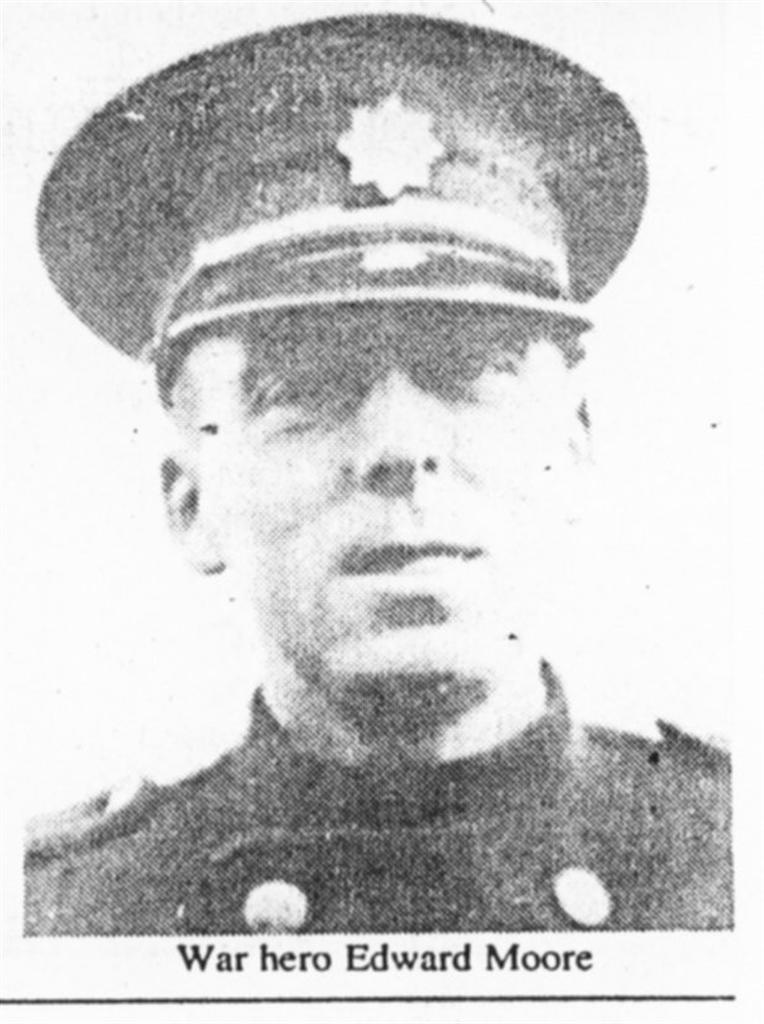
Edward Moore
GEORGE MEDAL.
Edward Henry James Moore. Auxiliary Fireman. King George VI presented Mr. Moore with the medal in September, 1941 at Buckingham Palace. He won the medal on 24, August. 1940. Mr. Moore and Mr. Wells also a Auxiliary Fireman were cycling along College Road when bombs started falling all around them. Both were hit by bomb splinters. Despite suffering serious injury himself, Mr. Moore tended to his friend's wounds before being strafed by enemy aircraft. "He laid over the top of his friend when they were machine-gunned". He then crawled from College Road to an air raid shelter near the Derby Arms pub in Margate Road. Unfortunately when help arrived his friend was already dead. The injuries Mr. Moore sustained included a severed artery in one of his arms and bullet wounds in his leg. So bad were his injuries that when his father went to look for him he was listed as dead, but luckily he went to Ramsgate Hospital and found him in an ambulance waiting to be transferred elsewhere.